A Call for Urgent Action Against Rising Anti-LGBTI Hate
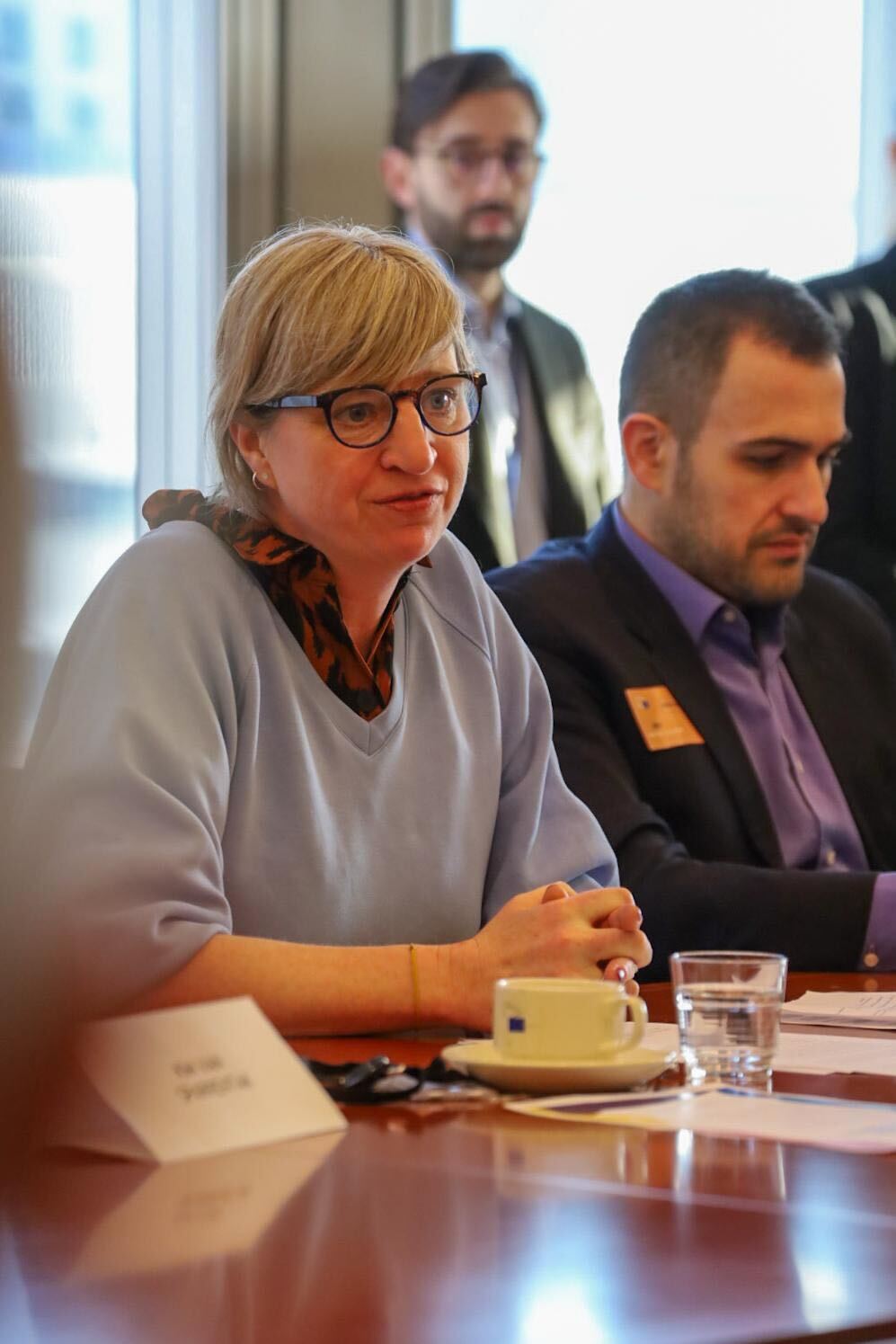
At the launch of our 2025 Annual Review, ILGA-Europe’s Advocacy Director, Katrin Hugendubel delivered a stark warning about the growing wave of anti-LGBTI hate, misinformation, and legislative attacks across the region. As governments weaponise discrimination to undermine democracy, she called for urgent political action to protect fundamental rights and freedoms. In today’s blog we share the full text of her speech.
Our Annual Review of the Human Rights Situation of LGBTI People in Europe and Central Asia, released this week, strives to provide a clear and comprehensive overview of the realities on the ground. The findings are based on individual cases, notable events, and legislative, political, and social developments, as well as data gathered from our own work and insights from LGBTI activists across the 54 countries covered in the report.
In recent years, LGBTI activists and organisations across Europe and Central Asia have repeatedly highlighted the worrying rise and normalisation of hate and violence in our region, including numerous attacks on LGBTI rights that systematically undermine fundamental freedoms.
The 2025 Annual Review once again evidences a clear increase in hate and violence. Furthermore, it illustrates how ongoing LGBTI-phobic hate and misinformation campaigns have laid the groundwork for legislation such as anti-propaganda and foreign agent laws. These laws, which ostensibly target LGBTI rights, actually extend much further—introducing censorship, stigmatisation, and persecution of human rights defenders and opposition voices; anti-democratic interference in elections through disinformation campaigns; and, ultimately, laws that erode fundamental freedoms and the principles of democracy. LGBTI rights are being used as an entry point for broader repressive measures.
LGBTI-phobic hate speech, sexism, and misogyny are increasingly normalised, often fuelled by public figures, including political and religious leaders and state institutions. Politicians in several countries, including Austria, Belgium, Bosnia & Herzegovina, Czechia, Moldova, and Romania, have weaponised discriminatory narratives against LGBTI people during election periods.
To cite just a few examples: in Austria, the far-right FPÖ spoke of “transgender brainwashing” and sought to cut taxpayer funding for what it termed “queer experiments”. In Belgium, Vlaams Belang repeatedly invoked the notion of “gender madness”. The President of Republika Srpska in Bosnia & Herzegovina was fined for hate speech during the election campaign.
The Georgian Elections Observatory (GEO), which focuses on fact-checking pre-election narratives, analysed statements made by senior members of the ruling Georgian Dream party, revealing that ‘LGBT propaganda’ was framed as a Western imposition and linked to a perceived threat to national survival. A similar misinformation campaign in Moldova suggested the country would be overrun by the Western LGBTI agenda ahead of the October elections. In Romania, Călin Georgescu’s electoral campaign during the first presidential election round intensified hate speech against the LGBTI community, even advocating for the re-criminalisation of homosexuality in the Penal Code.
Hate crimes and violent incidents have been reported in the vast majority of countries covered in this report. In Albania, these include stoning attacks against lesbian activists and physical assaults on trans women, with no accountability measures taken. A migrant trans woman was murdered in a hotel room in Copenhagen. Just one day after the Georgian Parliament passed its anti-LGBTI law, celebrity trans woman Kesaria Abramidze was found brutally murdered in her apartment.
In Armenia, while the successful prosecution of the country’s first hate crime against a gay man marks progress, violence against trans people remains unaddressed, and draft anti-discrimination legislation continues to stall. In Germany, during Pride season (June–September 2024), the Centre for Monitoring, Analysis and Strategy documented a surge in extremist mobilisation against Pride events across 27 cities, involving violence and intimidation. The Federal Ministry of the Interior reported 22 protests in this period.
The French Ministry of the Interior released a report showing a 13% increase in anti-LGBTI offences in 2023, with assaults, threats, and harassment rising by 19%, totalling 2,870 cases. The country chapter for France this year lists numerous homo- and transphobic attacks, including two transfemicides. Similarly, Italy recorded a troubling increase in bias-motivated violence in 2024.
Governments are actively fuelling anti-LGBTI sentiment, often followed by legislative proposals restricting freedom of expression, association, and fair elections. In seven countries across the region, so-called ‘LGBT propaganda’ laws, which seek to criminalise LGBTI visibility, ban content, silence activists, and restrict freedom of assembly, were either discussed, proposed, or adopted.
In Kazakhstan, parliamentarians proposed including “LGBT propaganda” in the list of extremist crimes under the Criminal Code, with penalties of up to seven years’ imprisonment. In Romania, a draft law was introduced to censor LGBTI issues in schools, the media, and public spaces, also seeking to ban Pride marches and related public assemblies.
The most far-reaching of such laws came into force in Georgia last December. The “Protection of Family Values and Minors” law prohibits non-heterosexual people from adopting children, prevents
trans and intersex people from changing their gender markers on documents, outlaws public gatherings that promote same-sex relationships, and bans educational institutions from presenting what the government terms “LGBTI propaganda”. It also prohibits legal gender recognition, criminalises medical procedures related to transitioning, equates same-sex relationships with incest, and designates 17 May as a “Day of Family Purity and Respect for Parents”.
Other countries have focused on targeting the education sector, restricting or outright banning LGBTI topics from curricula and awareness-raising initiatives. In Hungary, teachers fear mentioning SOGIESC (Sexual Orientation, Gender Identity and Expression, and Sex Characteristics) topics in classrooms due to the anti-LGBTI law—a fear that has now spread across the region.
Similarly, access to trans-specific healthcare, particularly for minors, has been a major target in 2024. Politicians and governments have exploited trans healthcare as a campaign issue. For instance, Austria’s Chancellor and ÖVP leader proposed banning hormone treatments for under-18s without medical justification and included this in the party’s election manifesto. In Germany, the CDU pledged in its election manifesto to repeal the newly enacted legal gender recognition law. Following the UK Cass Review, barriers to trans healthcare have intensified in France, Italy, Ireland, Poland, the UK, Andorra, Georgia, Hungary, Moldova, Romania, and Russia, placing trans lives at further risk.
Governments are increasingly adopting Russian-style tactics, forcing human rights NGOs to register as ‘foreign agents’ to undermine their legitimacy, restrict funding, and stifle human rights activism. In 2024, Bulgaria, Georgia, Hungary, Kyrgyzstan, and Montenegro proposed or adopted foreign agent laws, posing a direct threat to civil society. In Russia and Turkey, human rights defenders are already labelled as foreign agents or state threats.
As an increasing number of governments crack down on fundamental rights, LGBTI people are being forced to flee persecution, even within Europe and Central Asia. Yet, many European countries are denying asylum claims based on inadequate assessments of country situations or arbitrary credibility judgements. In Germany and Ireland, for example, several LGBTI asylum seekers from Ghana were denied asylum despite facing significant threats to their lives.
Despite these challenges, LGBTI activists remain resilient. They continue to organise Prides, provide support for the most vulnerable, and fill gaps in essential services, such as homelessness support and humanitarian aid in Ukraine. Progress is still being made: Germany has adopted legal gender recognition based on self-determination, workplace protections have been strengthened, and sexual orientation and gender identity have been included in educational curricula in Czechia, Serbia, Slovenia, and Switzerland.
While governments scapegoat LGBTI people and introduce restrictive laws, courts across Europe are upholding LGBTI human rights, issuing key rulings on asylum procedures, hate speech, freedom of expression and association, legal gender recognition, and sexual and reproductive rights. However, political leaders must not rely solely on courts to protect human rights.
This report underscores a global trend: the normalisation of anti-LGBTI rhetoric is a direct assault on the democratic principles that underpin our societies. Political leaders at both the European and national levels must act decisively to counter these growing attacks on democracy.
Click here to download the 2025 Annual Review, see our trends analysis, or search by country, theme, or institution.
Annual Review 2025
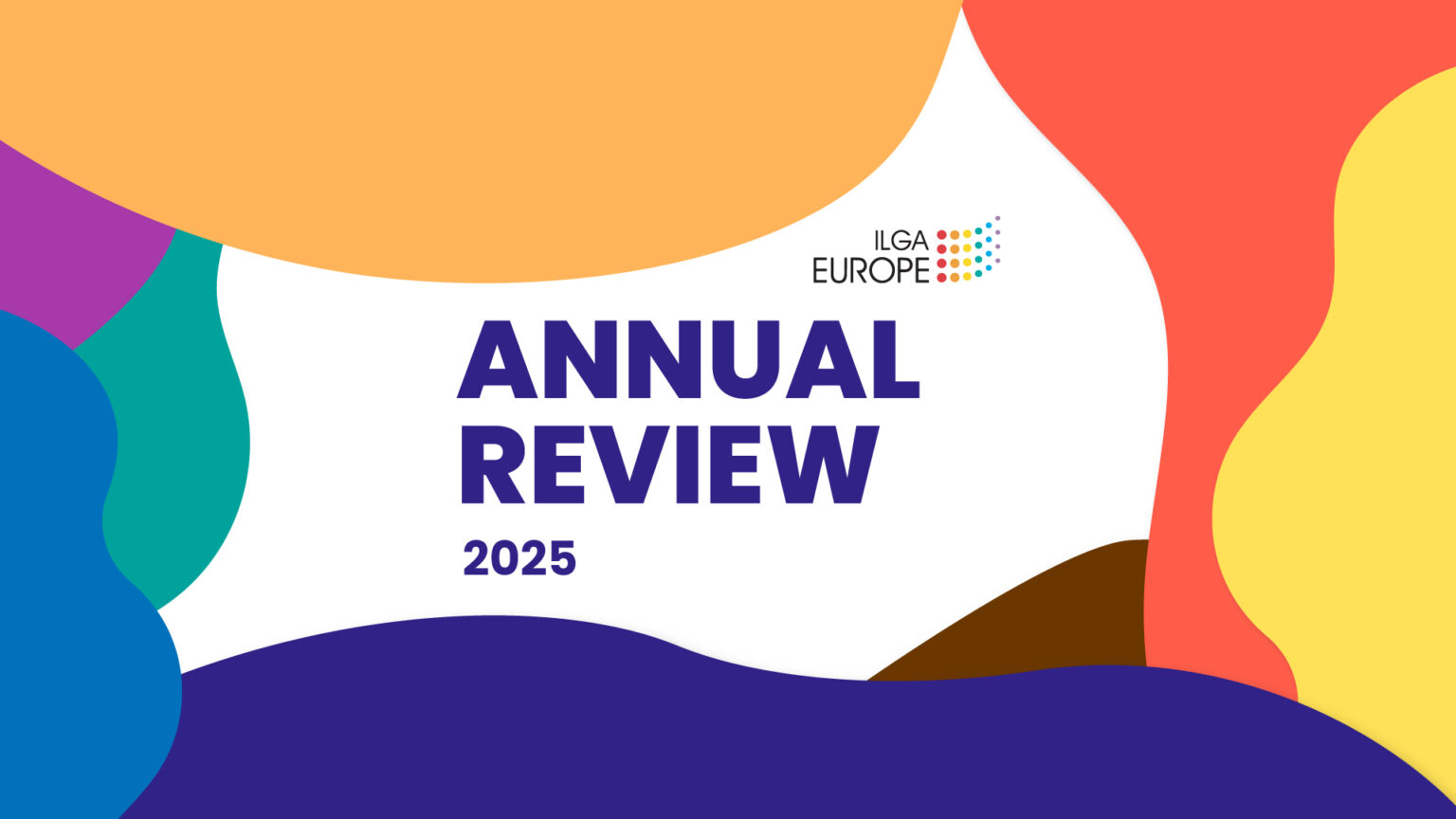
Below you can select Annual Review 2025 by topic and download the highlights and trends from this edition.
Select your topic
Choose a section of the Annual Review to preview:
2025 HIGHLIGHTS AND TRENDS
Here are the key overview findings of this edition of the Annual Review. To access all our analysis, download the full trends report.
1. Increasing restrictions
In seven countries, so-called ‘LGBT propaganda’ laws have been enacted or proposed, criminalising visibility and restricting discussion of LGBTI issues. In parallel, ‘foreign agent’ laws targeting NGOs have been either proposed or introduced in Bulgaria, Georgia, Hungary, and Montenegro, forcing LGBTI organisations to register as foreign-funded entities.
2. Education being leveraged
These laws have been increasingly leveraged in education sectors, restricting or entirely preventing the inclusion of LGBTI issues in curricula and awareness-raising initiatives. In addition, attempts to introduce legislation excluding LGBTI topics from sex education were recorded in Bulgaria, Hungary, Italy, the Netherlands, Luxembourg, Norway, Romania, Russia and Slovakia.
3. Consequences of the normalisation of hate speech
Hate crimes have reached record levels, fuelled by a normalisation of hate speech by political and religious leaders. At the same time, fear-mongering is being used to justify restrictions on trans healthcare in countries such as Georgia, Hungary, Ireland, Romania, and the United Kingdom.
4. Arbitrary asylum rejections
As governments intensify their crackdowns, LGBTI individuals are being forced to flee, yet many European countries—including Austria, Belgium and Ireland—are denying asylum claims on arbitrary grounds, with applicants rejected for not seeming ‘gay enough’.
5. Courts upholding LGBTI human rights
While governments are increasingly scapegoating LGBTI people to push restrictive laws, the courts both in the EU and across Europe are in turn upholding LGBTI human rights, with key judgements on procedures for LGBTI asylum seekers, anti-LGBTI hate speech, freedom of association and expression, legal gender recognition, and sexual and reproductive rights.
New Era of Coordinated Attacks on Foundations of Fundamental Rights, European Report Finds
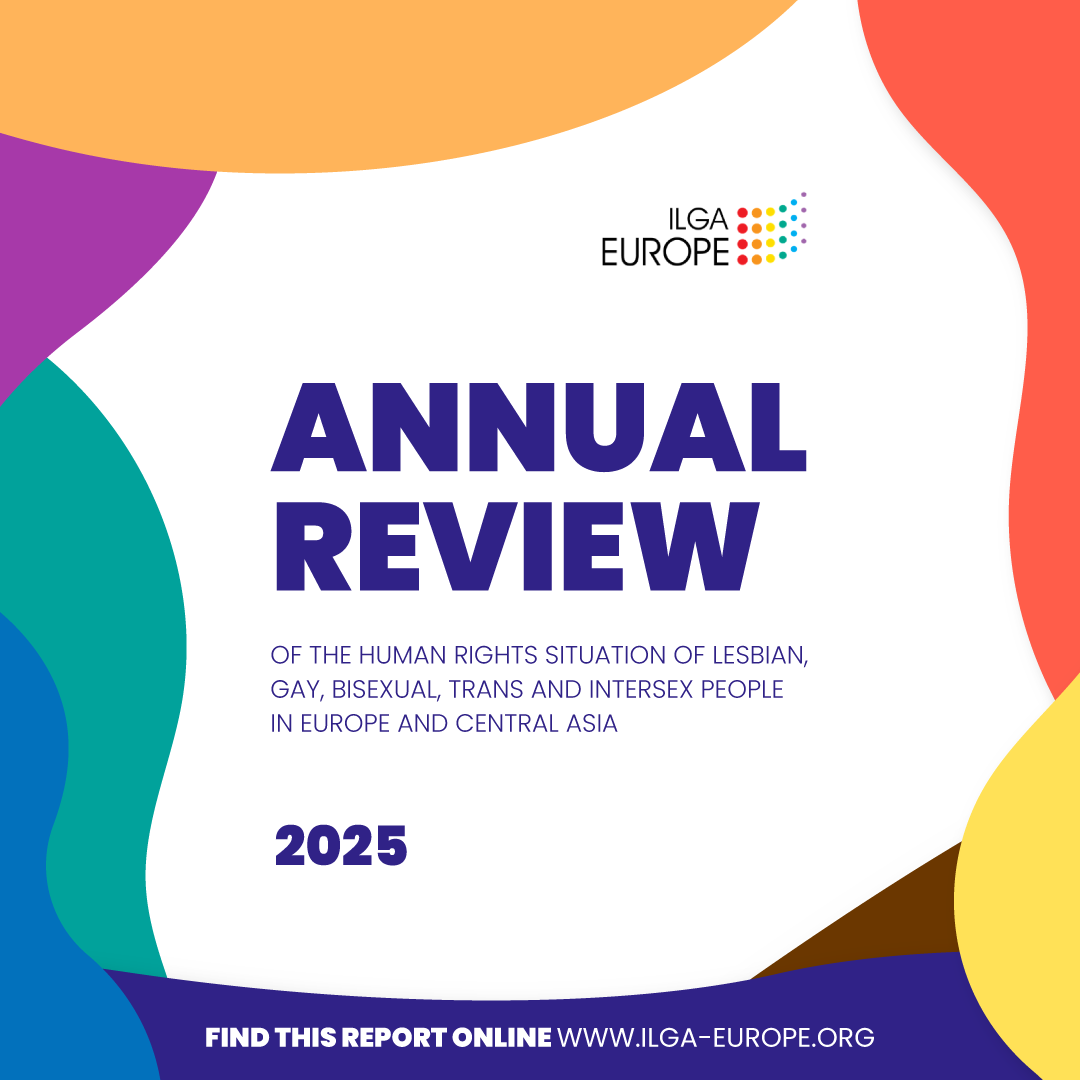
A major report published today identifies how LGBTI people are being weaponized to erode the foundations of freedom and democracy across Europe.
Released today, February 18, 2025, ILGA-Europe’s ‘Annual Review of the Human Right Situation of LGBTI People in Europe and Central Asia’ warns of a new era in which rising anti-LGBTI legislation threatens fundamental rights. Governments are fueling anti-LGBTI sentiment to push laws that restrict freedom of expression, association, and fair elections.
Governments are increasingly adopting tactics similar to Russia’s, forcing NGOs to register as ‘foreign funded’ to undermine their legitimacy, restrict funding, and stifle human rights activism. Known as ‘foreign agent’ laws, these measures are framed as protecting families and traditional values while often specifically targeting LGBTI NGOs. Last year in Bulgaria, Georgia, Hungary, Kyrgyzstan, and Montenegro, proposed foreign agent laws posed a direct threat to civil society.
Such legislation is enacted with or in the wake of so-called ‘LGBT propaganda’ laws that seek to criminalise visibility of LGBTI people, ban content, silence activists and restrict freedom of assembly, which have been either discussed, proposed or adopted in seven countries (Azerbaijan, Belarus, Bulgaria, Georgia, Kazakhstan, Romania, and Slovakia). These laws have been increasingly leveraged in education sectors, restricting or entirely preventing the inclusion of LGBTI issues in curricula and awareness-raising initiatives. In addition, attempts to introduce legislation excluding LGBTI topics from sex education were recorded in Bulgaria, Hungary, Italy, the Netherlands, Luxembourg, Norway, Romania, Russia and Slovakia.
In this context, LGBTI-phobic hate speech, sexism and misogyny are increasingly normalised, often fuelled by public figures, including political and religious leaders and state institutions. This is in turn driving an unprecedented surge in violence as hate crimes have reached record levels across the region.
The normalisation of hate is also providing justification for the blocking of healthcare for trans people. Andorra, Georgia, Hungary, Ireland, Moldova, Romania, Russia, and the UK have all put in place new barriers to care. Following the UK Cass Review, efforts to restrict trans healthcare for minors have emerged in Austria, France, Italy, Ireland, Poland, and the UK, putting trans lives further at risk.
As an increasing number of governments crack down, LGBTI people are being forced to flee—but Europe is closing its doors. Russia, Kyrgyzstan, and Turkey are intensifying persecution, and Turkmenistan is entrapping and torturing LGBTI individuals. Yet, many European countries, including Austria, Belgium, Bulgaria, Ireland and the UK, are denying asylum claims based on outdated, arbitrary assessments, with some officials rejecting applicants for not ‘seeming LGBTI enough.’
According to ILGA-Europe’s Executive Director, Chaber: “This report confirms what many of us have feared—we are entering a new era where LGBTI people have become the testing ground for laws that erode democracy itself. Across Europe and Central Asia, governments are using anti-LGBTI rhetoric to justify restrictions on free speech, civil society, and fair elections. What begins as an attack on LGBTI rights rapidly grows into a wider assault on the rights and freedoms of all individuals in society. This is not just an LGBTI issue; it is a crisis for human rights and democracy as a whole.”
ILGA-Europe’s Advocacy Director, Katrin Hugendubel added: “While governments are increasingly scapegoating LGBTI people to push restrictive laws, the courts both in the EU and across Europe are in turn upholding LGBTI human rights, with key judgements on procedures for LGBTI asylum seekers, anti-LGBTI hate speech, freedom of association and expression, legal gender recognition, and sexual and reproductive rights. But at this critical time, our leaders cannot simply leave the protection of human rights to the courts. Politicians at both the European and national levels must act decisively to counter the growing attacks on the cornerstones of democracy we are seeing. The normalisation of anti-LGBTI rhetoric is not just a threat to one community—it is now a proven direct assault on the democratic principles that underpin our societies.”
Further Information
Download a full analysis of the trends here
Read the ILGA-Europe’s Annual Review here
See up-to-date legislative developments in each country with ILGA-Europe’s Rainbow Map
Annual Review 2024
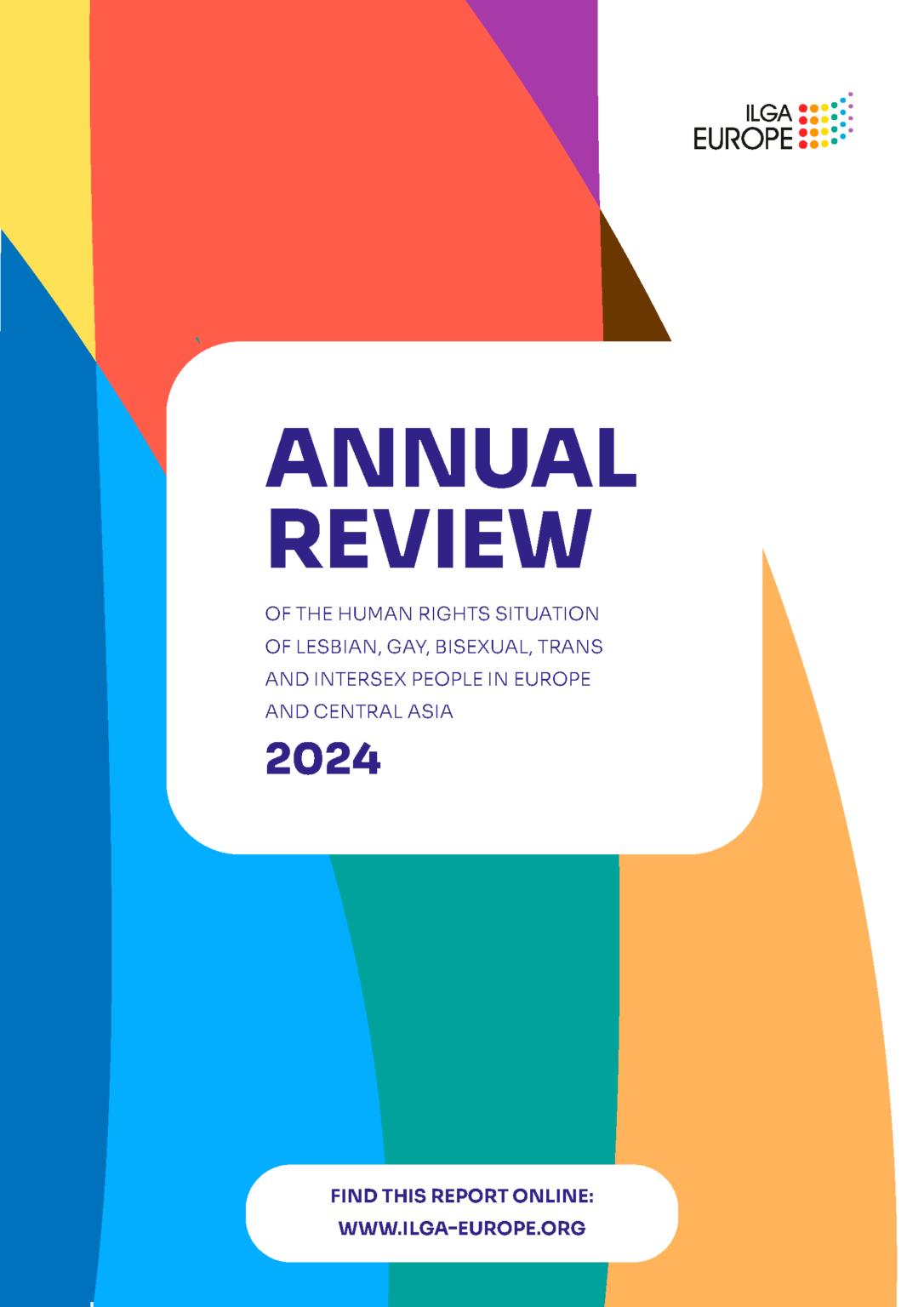
the 13th edition of our Annual Review of the Human Rights Situation of Lesbian, Gay, Bisexual, Trans and Intersex People in Europe and Central Asia.
The publication includes events that occurred between January and December 2023.
It provides a snapshot of what happened during the year, at national, regional and international levels, and it documents progress and trends regarding the human rights situation of LGBTI people.
We must warn that some parts may be potentially triggering for some readers. We must also stress that this document is not an exercise in apportioning blame. ILGA-Europe’s goal is not to point fingers at specific countries. Instead, this publication intends to serve as a tool for the exchange of best practices and policies, and as an open invitation for enhanced cooperation between governments and LGBTI civil society.
ILGA-Europe want this publication to meet our readers’ expectations and needs, and welcome any suggestions for improvement. We hope that you will find this edition of the Annual Review informative and useful.
Select INFORMATION
2024 Highlights and trends
Here are the Highlights and Trends that we currently identify for the human rights situation of lesbian, gay, bisexual, trans and intersex people in Europe and Central Asia.
Institutional Reviews
ORGANISATION FOR SECURITY AND COOPERATION IN EUROPE
Country Reviews
Themes
EQUALITY AND NON-DISCRIMINATION
FREEDOM FROM TORTURE, CRUEL, INHUMAN OR DEGRADING TREATMENT
PARTICIPATION IN PUBLIC, CULTURAL AND POLITICAL LIFE
SEXUAL AND REPRODUCTIVE RIGHTS
SOCIAL SECURITY AND SOCIAL PROTECTION
Download full report
Do you have any questions? Reach out to us at info@ilga-europe.org.
Alarming surge in transphobic speech across Europe sparks concern for EU elections

Ahead of the EU Elections next June, a new report shows a stark rise in anti-LGBTI, and in particular, transphobic statements from politicians across Europe.
Published today by ILGA-Europe, the 13th Annual Review of the Human Rights Situation of LGBTI People in Europe and Central Asia alarmingly reports hate speech from politicians in 32 European countries over the course of last year, 19 of them member states of the EU.
There has been a clear accumulation of hate speech against the lesbian, gay, bisexual, trans and intersex (LGBTI) community from officials across Europe, much of it targeting trans people, in countries including EU member states Austria, Bulgaria, Croatia, Cyprus, Czechia, Denmark, Germany, Greece, Hungary, Ireland, Italy, Latvia, Luxembourg, the Netherlands, Portugal, Romania, Slovakia, Spain, and Sweden.
The vast majority of anti-trans statements instrumentalise children, using scare tactics to create opposition to trans minors’ access to healthcare and restrictions on education. This is a broader trend we see in the use of children, with politicians across Europe claiming that limiting access to information about LGBTI people prevents harm to minors.
The report clearly shows that demonising from politicians combined with attempts to introduce legislation is impacting suicide rates and mental health, especially for young LGBTI people, and an escalation in violent protests outside schools and libraries, making young people unsafe.
This fear mongering has directly led to a further rise in attacks. Of the 54 countries reporting in the Review, only six of them reported no hate crime in 2023. In the other 48 countries, much of the reported verbal and physical violence targeted trans people. Only one EU member state reported no hate crime.
Says Katrin Hugendubel, Advocacy Director with ILGA-Europe: “It is in this climate that the European Parliament elections will take place next June. The public discourse is becoming more polarised and violent, particularly against trans people, and the LGBTI community has experienced the highest and most severe violence across Europe in decades.
“The very core values and standards upon which the EU was founded – respect for human dignity and human rights, freedom, democracy, equality and the rule of law – are being called into question, and human rights, and in particular the human rights of LGBTI people, are facing a strong challenge from far-right forces. LGBTI people’s rights and humanity are increasingly being exploited to divide societies, undermine democracy, the rule of law and human rights.”
Next week, ILGA-Europe will launch their Come Out 4 Europe campaign, which will give candidates for the European Parliament an opportunity to show how they will support and protect the rights of LGBTI people as elected members of the European Parliament.
Says Executive Director of ILGA-Europe, Chaber: “LGBTI rights are under attack, and children are being harmed in the process. As we witness the rise of political forces that question basic fundamental rights and freedom, the elections next June will be a pivotal moment for the EU, and for LGBTI people. In light of the findings of the 2024 Annual Review, our ‘Come Out 4 Europe’ campaign will call for clear political commitments on safeguarding human rights, democracy and freedom from candidates for the European Parliament.”
Anti-LGBTI violence in Europe and Central Asia: The Numbers
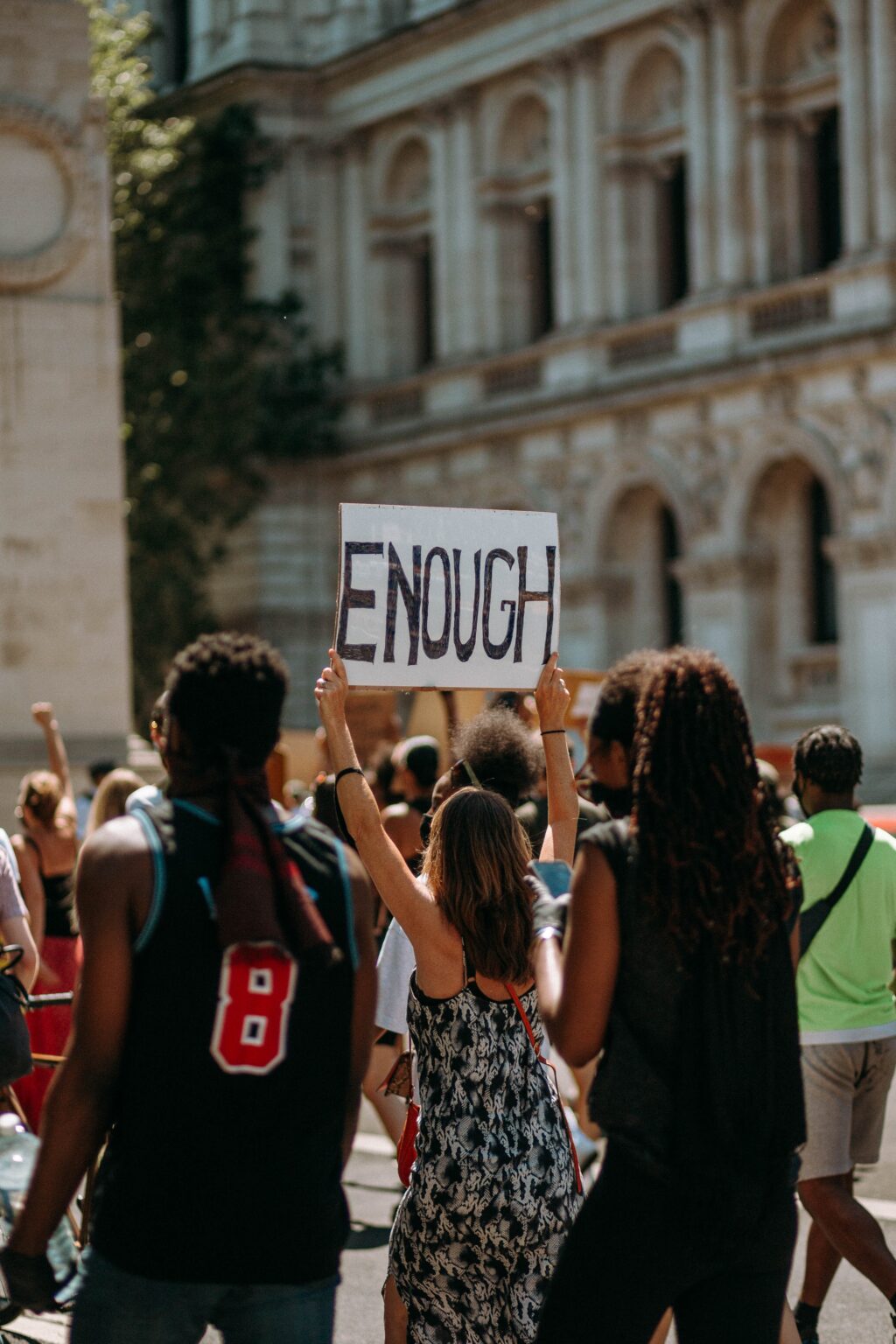
The latest ILGA-Europe Annual Review reported on a deeply worrying rise of violence against LGBTI people in Europe and Central Asia, most of it related to the growing prevalence of hate speech from public figures. Here are the facts in the 34 countries we reported on.
In 2022 there was a stark rise in violence against LGBTI people, not only in numbers but also in the severity of that violence, as reported in the latest edition of our Annual Review of the Human Rights of LGBTI people in Europe and Central Asia. In this blog you will find the main figures and key cases that reflect the situation in every country. Learn more about how LGBTI organisations and activists are boldly responding to anti-LGBTI violence and much more in our full report.
Armenia
In October, two young gay men committed suicide after a photo of them kissing went viral and received endless hate messages. The suicide shook the community. A discussion was broadcast on TV afterwards, featuring anti-LGBT statements.
Pink documented 27 cases of physical and sexual violence, and threats of violence and threats towards LGBT people during 2022, ten of which were committed by family members. These included beatings, stabbings, and other serious attacks. The ten recorded cases of domestic violence on grounds of SOGI were of physical, psychological and economic nature. In most cases, the parents learned about the LGBT identity of the victims, and then beat, harassed, threatened, or locked them up. One case was partner violence. Of the 27 cases of violence, seven were lesbian or bisexual women, 11 were gay or bisexual men, and 12 were trans or non-binary.
Austria
Hate crimes continued to be a serious issue, with over two hundred incidents just in the first three months of the year. The Ministry of Interior’s annual hate crime report documented 376 hate crimes against LGBTIQ people in 2021 although over 80% of the cases may not be reported. SPÖ (Social Democratic Party) also published a report and called for a national strategy against hate, exclusion and discrimination.
Azerbaijan
One of the most prominent LGBTQI+ activists in the country, Avaz Hafizli, was brutally mutilated and murdered by his cousin in February. The police, who previously ignored Hafizli’s requests for protection, wrapped the body in a rug and transported him in a garbage truck.
In August, the court sentenced the perpetrator to nine and a half years in prison but ignored the homophobic motif and the brutality of the murder. Civil society has firmly criticised the meagre judgment, which could have given twice as many years to the killer.
Another human rights activist, Bakhtiyar Hajiyev was kidnapped by masked men and tortured. A man on the metro in Baku threatened to kill LGBT people with a hammer.
On 7 September, a trans woman Emily Hajizade was attacked in Baku Boulevard by the park’s security guards. Emily was also abused by her family, who threatened to kill her. In September too, a trans woman was stabbed several times in Baku’s Narimanov park. She was previously detained and her head was forcibly shaved by the police. The police denied the murder and said they merely detained her. Activists and her family have been unable to find her since.
Bosnia and Herzegovina
Sarajevo Open Centre documented 11 anti-LGBTI hate crimes this year – six were reported to the authorities.
Belgium
The Interfederal Centre for Equal Opportunities (Unia) shared that the number of homophobic hate crimes had been on the rise and continued to grow between 2020-2021.
A study based on 42 testimonies from LGBTQIA+ people was published in May, revealing that underreporting is extremely common in the Brussels region, that the anti-LGBTQIA+ motif of attacks is often unregistered by the police, and investigations rarely yield results.
In August, a study in Flanders found, on the basis of over 400 responses from LGBTQ+ people, that one in four have been subject to threats or physical assault.
Croatia
The Ombudswoman’s annual report found that 2021 marked a sharp increase in anti-LGBT hate crimes. The Ombudswoman affirmed that hate speech by politicians can contribute to such a trend. In July, for instance, three gay men were verbally and physically assaulted in a club.
Estonia
On 9 July, a migrant black trans woman from Jamaica was murdered in her accommodation in downtown Tallinn. Two men were arrested and the investigation is ongoing.
Finland
Pride organisers across Finland said in a survey that vandalism and hate speech were far too common
In the town of Lapua four youngsters detonated a homemade bomb at the other end of a building where a Lapua Pride event was taking place. Lapua Pride also received violent threats in social media. In the town of Mikkeli, a homemade bomb was detonated by two young persons close to where the Pride march was taking place.
The case of high school students in Savonlinna made headlines in August. Several students spoke about suffering anti-LGBT harassment, including death threats, intimidation, being followed home, and being almost run over by cars. The students have been targeted by these attacks for years and had not received support from the school or the police.
France
The Ministry of Interior shared that the number of anti-LGBTI hate crimes rose by 28% between 2020-2021. Between 2016-2021, the number of incidents doubled. 2021 saw a temporary decrease presumably due to the COVID-19 pandemic. The Ministry also highlighted that these numbers are in no way total, as a mere 20% of victims report threats and attacks to the police.
SOS Homophobie found a similar increase this year, noting the high rates of anti-trans insults and violence.
Georgia
Trans women were verbally abused and their home was attacked in May – the police made no arrests. In November, a cisgender woman was killed in Tbilisi. The perpetrator was under the impression that the woman was trans.
Germany
Hate crimes continued to be a serious issue this year, but about 90% of cases continue to go unreported. In Berlin, for instance, anti-LGBTI hate crimes rose by 17% in the past year. Lower Saxony also recorded an increase in homophobic crimes. The fatal attack against a trans man, who tried to stop a man from harassing two women at a Pride march, shook the community.
Greece
The national hate crime monitoring body’s annual report, published in May, found that crimes against LGBTQI+ people continued to be very common in 2021.
Hungary
Several hate crimes were committed this year, with the perpetrators in some cases referring to the 2021 ‘propaganda’ law as being “on their side”.
Iceland
Several hate crimes took place this year and were reported to the police. Anti-LGBTQI+ ‘barking’ grew increasingly common this year.
In August, the rainbow-coloured steps of a church were repeatedly vandalised. Also in August, nine rainbow flags were ripped down in Hellu, another flag in Kópavogur was vandalised, and posters were tagged with nazi symbols.
Samtökin ‘78 received ten reports of anti-LGBTQ harassment following Pride week.
Ireland
Hate crimes against LGBTQI+ people continued to be a serious issue, also affirmed by the government, the police’s annual hate crime statistics, and Dublin City where bias-motivated violence has become a particular concern.
In April, two men were murdered in separate homophobic attacks in the town of Sligo – a 22-yearold man awaits trial. Vigils were held in over 25 cities and towns.
Italy
In the follow-up of the Zan law having failed in 2021, anti-LGBT hate crimes continued (see a list of attacks here and here). Three migrant sex workers, including a trans woman, were murdered in Rome in November. In June, a trans woman who was suspended from her teaching job after socially transitioning committed suicide. A 19-year-old trans girl, Chiara committed suicide in October. Another trans woman, also called Chiara, took her own life in June.
The national observatory on lesbophobia published its report documenting one lesbophobic hate crime per month between 2011 and 2021. Non Una Di Meno’s monitoring work identified 112 lesbophobic and transphobic murders nationwide in 2022.
Latvia
Mozaika documented nine anti-LGBT hate crimes this year. None of the victims reported the cases to the police.
Kyrgystan
Kyrgyz Indigo’s (KI) Urgent Response Group provided legal consultation in 105 cases this year, which included outings and threats (18%), fake dates and blackmail (13%), physical violence (10%), family violence (16%), theft and extortion (10%), and police violence (20%). More than a third of the fake date cases were perpetrated by the police.
Montenegro
The LGBTI Drop-in Centre in Podgorica was vandalised with fascist and anti-LGBTI messages in July. The Prosecutor’s Office launched an investigation and the police have identified the perpetrators. On 21 December, Juventas’ LGBTIQ Centre in Podgorica was attacked. Police responded quickly in identifying the attackers.
Netherlands
The government reported 2,471 anti-LGBTI violence and discrimination cases in 2021, up from 2,336 in 2020 and 2,072 in 2019.
The Social and Cultural Planning Office’s (SCP) study, published in July, found that LGBT people face disproportionate rates of violence, one in three bisexual women has experienced sexual violence in the past five years and 44% have been targeted by online or offline sexual harassment in the past year.
A new report, ‘Invisible in Two Worlds’ found that trans people face domestic violence in great numbers, and that state assistance is inadequate.
North Macedonia
Coalition Margins documented four gender based/ domestic anti-LGBT hate crimes.
Norway
On June 25, a gunman killed two people and wounded more than 20 people outside Oslo’s queer haven and oldest queer bar, the London Pub. The terrorist attack, which was carried out during Pride week and on the night before the Oslo Pride march, shook the community and the country and was widely condemned.
The 2021 hate crimes report of the police found a drastic increase in anti-LGBT hate crimes, from 97 in 2020 to 240 in 2021.
Portugal
Between January and early December this year, ILGA Portugal received a total of 830 requests for contact or immediate support in cases of violence at home, loss of income, and evictions. Of these, 268 came from people who reached out for the first time. 220 cases of domestic violence and assault were reported this year, of which 71 were cases of gender-based violence.
Romania
Four hate crimes were perpetrated over the span of three weeks in the summer – all were reported to the police. Leaflets showing a gay man in a gas chamber and a nazi soldier pressing the gas button were left in MozaiQ’s courtyard in August. Civil society attributed the rise in violence to the tabling of the ‘propaganda’ bill. There was a clear rise in hate crimes during Bucharest Pride – over 20 victims asked ACCEPT for legal advice.
Russia
Hate crimes against LGBTI people, including murder, physical violence and extortion were committed again this year. The authorities failed to classify them as anti-LGBTI hate crimes.
Serbia
In its annual hate crime report, Da se zna! documented the highest number of anti-LGBT incidents since 2017: 83 cases of anti-LGBT hate crimes, hate speech, and discrimination in 2021, marking a 38% increase compared to 2020 (52). The number of hate crime cases sharply increased in August and September following a series of hateful statements by political and religious leaders. EuroPride billboards were vandalised.
The Belgrade Pride Info Centre was again attacked in February and October. For the first time, a politician, Belgrade’s deputy mayor Goran Vesić condemned the violence. None of the perpetrators in the 14 attacks have been prosecuted.
Several people were attacked during, directly after and in the weeks after EuroPride.
Slovakia
On 12 October, two young men Matúš Horváth and Juraj Vankulič were murdered by a gunman outside one of Bratislava’s two queer bars, Tepláreň. The gunman wounded a woman as well and claimed responsibility for the unprecedented white supremacist terrorist attack before killing himself. This was the first terrorist attack in modern Slovak history.
Civil society had warned about the consequences of the growing anti-LGBT political rhetoric and the inadequate response to hate crimes by law enforcement before – many have interpreted the murder as the culmination of the past years.
Slovenia
Legebitra documented four hate crimes and two cases of vandalism.
Spain
The annual report of the Ministry of Interior documented a record number of 466 anti-LGBT hate crimes in 2021 (2020: 277), with one in every four hate crimes targeting LGBT people. This is a 68% increase in one year. Coruña’s Observatory against LGBTI-phobia published its fourth annual report, finding a 71% increase in cases compared to 2021.
Anti-LGBTI murals and graffiti were also common this year. Several rainbow-coloured benches were vandalised in small towns again this year (see here and here).
Sweden
The concept Drag Queen Story Hour, during which drag artists read fairy tales to children in libraries, came under serious attack this year.
Switzerland
Anti-LGBT attacks continued to be an issue, with the number of hate crimes increasing. The joint report by TGNS, LOS, and Pink Cross documented 96 anti-LGBTQ hate crimes in 2021 – 50% more than the previous year. The majority of the incidents took place close to the 2021 referendum and parliamentary action on marriage equality. There was a sharp increase in transphobic hate crimes reported.
Turkey
Kaos GL’s annual monitoring report found that 2021 was one of the most violent years against the community to date, with eight recorded murders but suspects the actual number of murders is higher. The report also highlights the issue of widespread police violence, torture and ill-treatment, and unlawful detention, particularly at demonstrations. It was also reported that 30 per cent of all violations against LGBTI+ were about freedom of assembly and expression.
Ukraine
Nash Mir’s annual report documented 55 hate crimes against LGBT people in 2021. Nash Mir documented more than 75 hate crimes in 2022, the majority of which were in some way connected to military operations. Nash Mir noted that the numbers might be much higher as it was difficult to document cases in occupied territories.
United Kingdom
Hate crimes against LGBT people in the UK have reached dramatic numbers. The UK Home Office’s annual hate crime statistics report highlighted that homophobic hate crimes increased by 41% and transphobic hate crimes by 56%, in England and Wales. This marks the starkest annual increase since 2012. The report attributes the rise in transphobic hate crimes in part to anti-trans media reporting. Galop’s 2022 Hate Crime Report echoed these numbers and the reasons behind them.
In Northern Ireland, there were more hate incidents recorded across each hate motivation strand when compared with the previous twelve months (with the exception of faith/religion incidents) with 15% increase in homophobic and 24% in transphobic incidents. Research carried out by The Rainbow Project in 2021, has shown that 51% of those who had experienced hate crime had not reported it to the Police Services of Northern Ireland. The most common response was that they are still not confident that their complaints will be taken seriously, some unaware that PSNI can take action and were fearful of repercussions.
Galop’s report ‘LGBT+ Experiences of Abuse from Family Members’ highlighted that 29% of LGBT+ people have experienced abuse from family members – 60% attributed this to them being LGBT+. 63% of the victims were under 18 when they first faced violence at home. Galop’s adjoining report warned that support services for LGBT+ victims are rare and insufficient. Galop also published its ‘LGBT+ People & Sexual Violence Report’ on the basis of almost 1,000 LGBT+ survivors. More than half thought that the violence was inflicted upon them due to them being LGBT+ and most reported detrimental consequences on their mental health.
Search for your country chapter in our Annual Review of the Human Rights Situation of LGBTI People in Europe and Central Asia here.
For good and bad: The trending impacts on LGBTI human rights in Europe and Central Asia
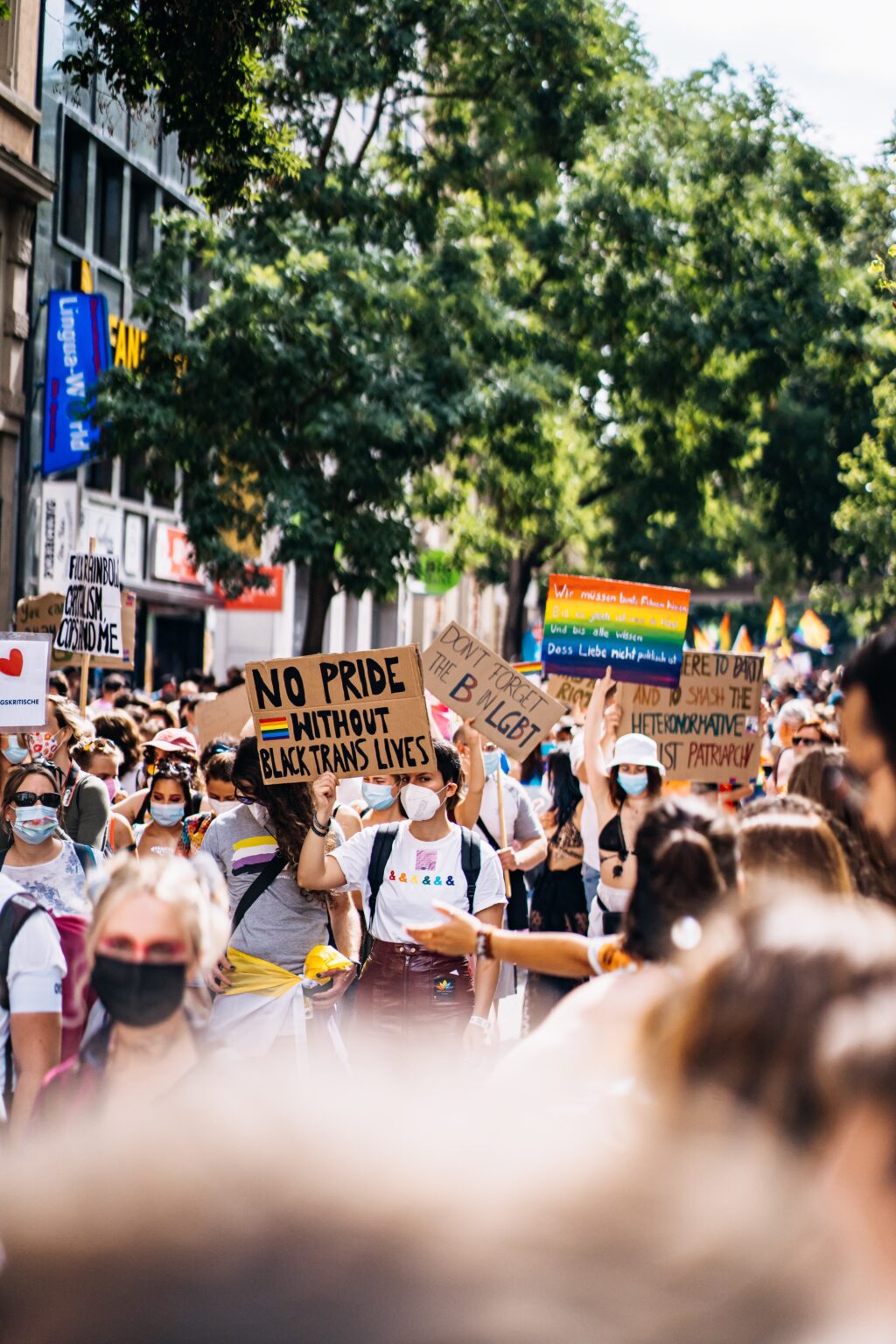
The most striking finding of ILGA-Europe’s Annual Review 2023 is a stark rise in the ferocity of anti-LGBTI hate and violence reported in Europe and Central Asia. But alongside this worrying trend, there are positive developments in areas such as legal gender recognition, public support, intersex human rights and civil society. Here are the key highlights.
At ILGA-Europe we’ve just published our Annual Review, showcasing the main developments and trends in the human rights Situation for LGBTI people in Europe and Central Asia. Disturbingly, the most striking finding this year is the levels of hate reported in the region. 12 years into this yearly reporting, the present edition finds that anti-LGBTI violence in 2022 was more targeted and extreme than ever in the history of our reporting.
Our Annual Review aims to paint a clear picture of the reality from the ground for our communities. It documents individual cases and events, as well as legislative, social and political advancements and regressions, and new available data. All reporting is based on the work of LGBTI activists in each country featured in these pages, as well as on our own work.
While the review points to the devastating consequences of the instrumentalisation of LGBTI people, mostly for political gain, there have been other developments in the direction of human rights and protection of LGBTI people.
We have not seen this severity of the violence before
For years, ILGA-Europe has been documenting the rise in hate while activists across the region have shown how anti-LGBTI speech, both online and by political and religious leaders, translates into violence harming people.
This phenomenon is across the board in this year’s Annual Review. For example, in France, the Ministry of Interior reported a 28% rise in hate crimes between 2020 and 2021. In Switzerland, LGBTI organisations reported a 50% increase between 2020 and 2021. Spain reported a 68% increase in 2021, while in England and Wales transphobic incidents rose by 56%.
There are also more reports than ever before of LGBTI people taking their lives, a clear sign how discrimination, hate speech and harassment are impacting mental health. In Italy, three trans women took their lives. Two of them were teenagers, the third woman was a teacher, who was suspended from school because she had socially transitioned. In Armenia, a young gay couple committed suicide after suffering harassment when a photo of them kissing went viral. These are just a few examples.
Sexual education is increasingly compromised
Education is a growing battleground in the resistance to LGBTI people and rights. In Hungary, as result of law banning LGBT content, teachers reported a fear of bringing sexual orientation, gender identity and other topics to the classrooms. In the Netherlands, 36 orthodox schools require anti-LGBTI declarations from pupils and parents, and the new Italian Prime Minister, Giorgia Meloni has publicly advocated for a ban on sex education in schools and the exclusion of LGBT people in children’s books.
Russia expanded its ‘propaganda law’ to prohibit positive and neutral information about LGBT people and “gender reassignment” to minors and adults. There was an alarming number of ‘propaganda’ charges or threats in educational establishments in the country. All in all, progression on sexual education is being challenged.
Public support for LGBTI people is growing
In parallel, the report finds growing support among societies for LGBTI people, also in countries where we might not expect it. For example, most Hungarians don’t consider ‘homosexual propaganda’ an important issue. In Poland, two thirds of the population support marriage equality and 60% support the abolition of anti-LGBT resolutions in the country.
What’s more, many politicians across Europe have shown their support throughout 2022. Many reacted with horror to the killings in Oslo and Bratislava and the European Parliament has publicly condemned the violations of LGBTI rights. We need more governments standing strong against hate in the media and online and more progress in advancing laws against hate crimes that protect LGBTI people.
There are more legal gender recognition laws that include self-determination
In the face of enormous backlash on trans people, and a number of forces trying to stop legal gender recognition (LGR), some countries made progress in 2022 and others showed a will to ensure a model of LGR based on self-determination.
Scotland, Finland and Spain were the best examples; by adopting LGR laws that include self-determination, these countries are showing a clear way forward for other governments.
Same-sex partnership is back on the agenda
After stagnating for a number of years, same-sex partnership recognition is on the rise again. Andorra adopted legislation to ensure heterosexual marriage and the recognition of same-sex civil partnerships guarantee the same set of rights. In Latvia, following a Supreme court decision ruling that same-sex couples should be given civil status, same-sex couples were recognised in court cases. Slovenia and Switzerland adopted marriage equality, including positive changes regarding adoption rights. Other countries took steps forward the adoption of laws that recognise same-sex partnerships.
While intersex human rights are rightfully taking a space in the agenda
There is also a growing awareness of intersex human rights across Europe. While Greece adopted a ban on non-vital medical interventions on children, the European Commission conducted surveys and interviews for the first EU study on the lives of intersex people and their parents (expected to be published this summer). The Council of Europe is preparing a Recommendation on intersex human rights while the Chair of European Commission against Racism and Intolerance and PACE General Rapporteur for the rights of LGBTI people shared supportive statements.
Behind every positive development, there are LGBTI activists doing hard work
LGBTI organisations and activists across our region are key to all the advances on LGBTI people’s rights and the support to their communities during 2022.
Despite difficult circumstances, more and more Prides are being organised, support for the most vulnerable in the community is provided and work with institutions and policy makers continues advancing LGBTI people rights.
More and more organisations report covering for gaps in service provision, and providing services where the community does not feel safe to access mainstreaming services, for example when it comes to shelter.
The most remarkable support was that of the LGBTI community in Ukraine through LGBTI organisations, as well as the support by activists across Europe for Ukrainian LGBTI refugees.
LGBTI activists are the central players in countries where progress has been made, as we’ve seen in Spain and Finland, where huge effort went into successfully keeping self-determined legal gender recognition on the right political track, despite fierce opposition.
The Annual Review of the Human Rights Situation of LGBTI People in Europe and Central Asia is published every February, as part of our Rainbow Europe package. We thank all those across 54 countries who worked with us to make sure our reporting was accurate.
Find out what’s been happening in your country here.
Deadliest Rise in Anti-LGBTI Violence in Over a Decade, our annual Report Shows

12 years into annually reporting on the human rights situation of LGBTI people, Europe’s leading LGBTI equality organisation finds that pervasive hate speech across the region has led to life or death consequences.
Launched today in Brussels, ILGA-Europe’s Annual Review of the Human Rights Situation of LGBTI People in Europe and Central Asia finds that 2022 was the most violent year for LGBTI people across the region in the past decade, both through planned, ferocious attacks and through suicides in the wake of rising and widespread hate speech from politicians, religious leaders, right-wing organisations and media pundits.
This is the 12th edition of ILGA-Europe’s report, which has charted the growing phenomenon of anti-LGBTI speech, as antipathy for LGBTI people has been driven and then exploited for political gain. It finds that as a result, attacks on LGBTI people with a conscious and deliberate will to kill and injure have increased to unprecedented levels, including two terror attacks outside LGBTI bars in Norway and Slovakia, which combined killed four people and maimed 22. There are reports of more murders and many suicides of LGBTI people across Europe, and not only in countries that are seen to be more regressive.
According to ILGA-Europe’s Executive Director, Evelyne Paradis: “At ILGA-Europe, we have been saying for years now that hate speech in all its forms translates into actual physical violence. This year, we have seen that violence become increasingly planned and deadly, leaving LGBTI people feeling unsafe in countries across Europe. We have seen proof that anti-LGBTI hate speech is not just the words of marginal leaders or would-be autocrats, but a real problem with dire consequences for people and communities. This phenomenon is not only in countries where hate speech is rife, but also in countries where it is widely believed that LGBTI people are progressively accepted.”
The report finds that while hate speech and its consequences have reached critical levels, national and local courts are reacting and prosecutions are on the rise in several countries. But according to Paradis, reaction is not enough.
“While we are getting better at dealing with outcomes, the focus has to be on stopping hate speech in all its forms. Across Europe, many politicians have reacted with horror to the killings of LGBTI people this year, and while clear expressions of solidarity are always needed, it does not address the foundation of the problem, which is the proliferation of using hatred against LGBTI people for political gain. Our leaders need to find ways to proactively fight the rise of hate speech, rather than finding themselves in the position of reacting to its consequences.”
It is not all bad news. There has been much progress reported in several countries, with the Review consistently finding that it is activists and their communities who are driving positive social change and managing to push legal protection forward, despite organised opposition.
According to Katrin Hugendubel, Advocacy Director with ILGA-Europe: “LGBTI activists are the central players in countries where progress has been made, as we’ve seen in Spain and Finland, where huge effort went into successfully keeping self-determined legal gender recognition on the right political track, despite fierce opposition. This is true of every issue that affects LGBTI communities across the region, showing that LGBTI people and organisations remain empowered and continue to make change happen.”
The 12th ILGA-Europe Annual Review is available here, alongside all the previous Annual Reports, charting the phenomenon of rising anti-LGBTI hate speech in Europe and Central Asia, and its consequences.
According to Paradis: “These successive reports tell a story of cause and effect that is not going to go away or diminish until politicians and policy makers understand that they have to get ahead of the problem. In the current climate, progressive leaders must find effective ways to tackle hate speech in all its forms, instead of finding themselves on the back foot, expressing sympathy for the families of the needlessly murdered, or those who have taken their own lives, while hatred continues to be fostered and exploited.”
For further comment, contact: Ana Muñoz Padrós, ILGA-Europe: ana@ilga-europe.org, +32 493 35 60 55
Annual Review 2023
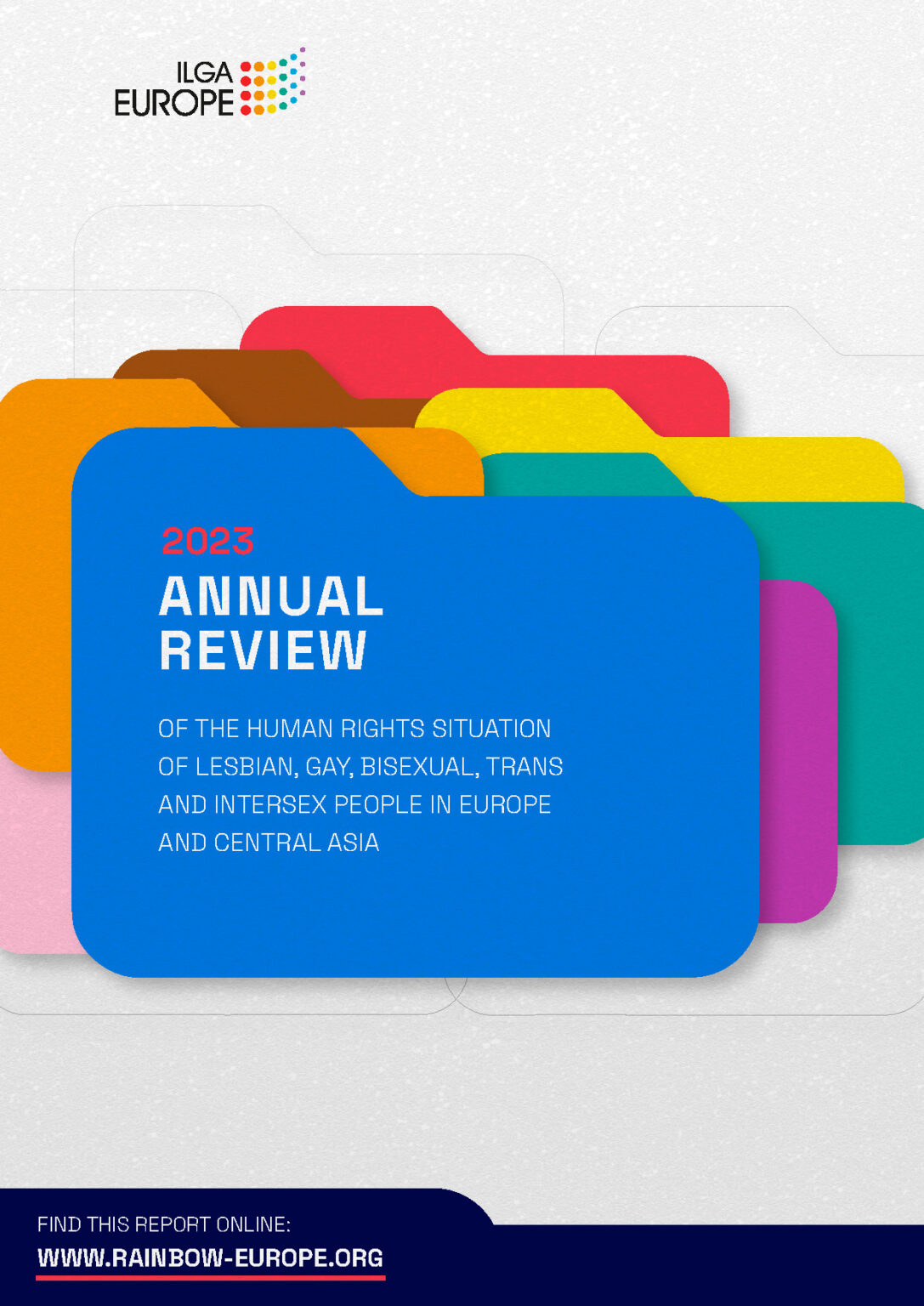
the Human Rights Situation of Lesbian, Gay, Bisexual, Trans and Intersex people in Europe and Central Asia between January-December 2022.
The Annual Review is ILGA-Europe’s annual publication documenting legal, political and social developments in 54 countries and 4 European institutions over the past calendar year. It is a unique report tracking key positive and negative trends in relation to LGBTI equality and human rights in Europe and Central Asia.
This year’s Review finds that finds that 2022 was the most violent year for LGBTI people across the region in the past decade, both through planned, ferocious attacks and through suicides in the wake of rising and widespread hate speech from politicians, religious leaders, right-wing organisations and media pundits. Read more on our press release.
Errata corrigenda
In Slovakia’s chapter we reported “On 12 October, two young men Matúš Horváth and Juraj Vankulič…” We believe this is incorrect, as it has been widely reported elsewhere that Juraj Vankulič identified as non-binary. Matúš Horváth was openly bisexual.
Also in Slovakia’s chapter we wrote “In late October, LGBTI NGOs launched the’ Ide ám o život/ ‘It’s About Our Life’ initiative…”. There is a typo error in the name of the initiative. The correct name is “Ide nám o život”.
6 positive developments and 6 worrying trends for LGBTI people in Europe
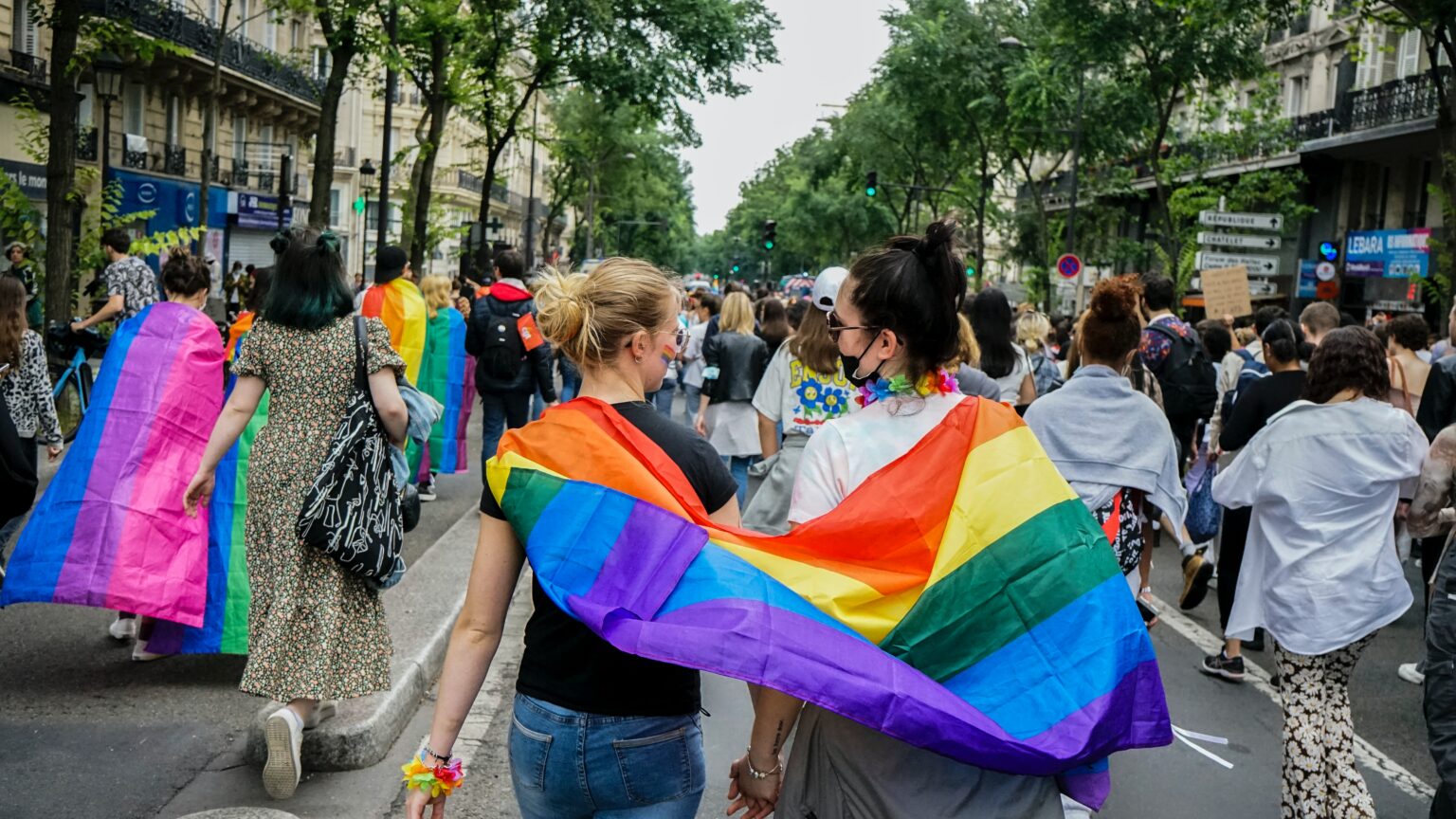
Our Annual Review of the human rights situation of LGBTI people in Europe and Central Asia shows that there have been two very different sides to the story in 2021. Read on to find out how come.
The scapegoating of LGBTI people for political gain is happening across Europe. In fact, for the third year in a row (see here and here), we’ve reported an enormous rise in anti-LGBTI speech from politicians and public representatives. And it’s not just in the usual suspects, Hungary and Poland. Politicians across the region are demonising LGBTI people, and this has led to a wave of anti-LGBTI violence in the streets of Europe.
However, this is just one side of the story. In the face of hate-speech from leaders who want to distract from their own failings and corruption, our Annual Review shows that there has been an unparalleled allied determination to tackle hatred and exclusion in many countries and at European level. National courts, EU institutions and more have been doing an extraordinary work to better protect the rights of LGBTI people throughout 2021, and this is a trend we want to see more of in 2022.
ILGA-Europe’s Annual Review of the Human Rights Situation of LGBTI people in Europe and Central Asia documents legal, political and social developments affecting LGBTI people and communities in 54 countries and four European institutions over the past calendar year.
The publication includes events that occurred between January and December 2021. It provides a snapshot of what happened during the year, at national, regional and international levels, and it documents progress and trends regarding the human rights situation of LGBTI people.
Six worrying trends for LGBTI people in 2021:
1. A severe rise of anti-LGBTI rhetoric from politicians
There was hate-speech from politicians targeting LGBTI people in at least 22 countries across Europe. A particular low point came on June 15, with Hungary’s introduction of legislation introducing a ban on the “portrayal and the promotion of gender identity different from sex at birth, the change of sex and homosexuality” for persons under 18.
On 3 April 2022, the same day as the Hungarian general elections, the ruling Fidesz party will hold a referendum. On 3 April 2022, the same day as the Hungarian general elections, the ruling Fidesz party will hold a referendum. The questions it poses are carefully designed to force voters into siding with Fidesz against the LGBTI community, and to tell the lie that the will of the Hungarian people is at odds with the human rights values of the EU.
2. Violence against LGBTI people was rife, and in every country
As a consequence, there was anti-LGBTI hate crime reported in every country. Germany, for instance, had a 39% increase in anti-LGBTI hate crime, while a new app in France, where users can report anti-LGBTI hate crimes, collected reports of 3,896 incidents in its first year. In the second year of the COVID-19 pandemic, domestic violence against LGBTI family members continued to take place widely. There were murders, assaults, corrective rapes, and anti-LGBTI police brutality. In many countries where police brutality took place, the police were not held accountable.
3. Rainbow flags were burned, torn down and desecrated
The rainbow flag was created in 1978 as a symbol of the unity and diversity of LGBTI communities. However, in 2021, it was instrumentalised as a symbol of division between supporters and detractors of LGBTI people. In the months following UEFA’s prohibition of Munich’s stadium being lit up in rainbow colours during the European Football Championship in June, in support LGBTI people in Hungary, the rainbow flag was desecrated in countries other than those where we’ve reported such activity, including Germany, Ireland, Italy, Netherlands, Norway, Finland and Spain.
4. Young LGBTI people were especially at risk
A 14-year-old girl in France took her own life after years of lesbophobic and Islamophobic bullying. Over half of LGBTI students in Denmark had suicidal thoughts or self-harmed, while 82% of LGBTI students in Northern Ireland thought of suicide. 80% of LGBT students feel unsafe in school in Ukraine and 40% missed school only this past month because of this. These are just some of the reported cases and figures.
LGBTI youth were often targeted by politicians’ hate speech. This particularly affected trans minors. For example, in Sweden, several clinics removed service provision to trans youth on their waiting lists following the pressure of anti-trans opposition.
5. In several countries, legal gender recognition reform remains stagnated
The false narrative pitching trans rights against women’s rights continued this year.
Awaited reforms on legal gender recognition procedures did not advance in Andorra, Belgium, Croatia, Finland, Germany, Montenegro, North Macedonia, Slovenia, Sweden and Slovakia, and regression in Greece, Poland, Portugal and Russia. Meanwhile there was some progress in Bulgaria, Croatia, Georgia, Kosovo, Lithuania and Turkey.
The Spanish government adopted its draft LGR legislation this year, setting out self-determination for those 16 or over. As the legislation was debated across the media, there was a spike in anti-trans rhetoric, including from politicians and members of government and a rise in anti-LGBTI hate crime.
6. LGBTI asylum seekers continued to face specific difficulties and injustices
The situation for LGBTI asylum seekers is almost invariably fraught, including in countries there where there’s been positive legislative change for LGBTI people. Denmark, Estonia, France, Germany, Greece, Malta, The Netherlands, Portugal, Spain, Sweden and the UK are among the countries where LGBTI asylum seekers face double discriminations.
Six positive developments for LGBTI people in 2021:
1. Public support for LGBTI people has never been stronger
It is clear that state-sponsored anti-LGBTI rhetoric and legislation is not matched by public opinion. For example, in Hungary, polls show the public sees the new legislation as a political tool. 73% of Hungarians reject the government’s false claim that gay and lesbian people abuse or harm children. 74,5% of Hungarians believe that transgender people should be able to change their gender and name in their official document, while 59% support same-sex marriage.
Also, hardly any Serbians know trans people, but 60% think they should be protected from discrimination. 68% of Romanians think all families, including rainbow families, should be protected, while 40% of Bulgarians would support a party that is pro-LGBTI.
2. LGBTI youth demonstrated across Europe
Young LGBTI people and their peers mobilised in several countries along 2021. In Norway, 14-year-old students in eighth grade organised the first Pride in their town. In Ukraine, hundreds of LGBTI young people held a six-hour rave outside the president’s office demanding comprehensive hate crime legislation.
3. Courts and human rights institutions firmly protected the rights of LGBTI people
National human rights institutions (NHRIs) and courts in many countries have done a strong job protecting the rights of LGBTI people. Many LGR denials were overturned in Hungary, while Bell v. Tavistock, the case before the Court of Appeal on the question of whether puberty blockers could be prescribed to under-18s with gender dysphoria, was quashed in the UK. Several countries issued fines and prison sentences over hate speech and hate crime incidents. The courts in Turkey ruled against the conviction of students for taking part in the METU Pride march, in a case that had lasted for over two years.
4. The top European courts defended LGBTI people’s human rights
Several positive judgments were delivered this year at the European Court of Human Rights on hate crimes, freedom of assembly, legal gender recognition and family rights. The Court of Justice of the EU ruled in the case of baby Sara, the daughter of Bulgarian and British lesbian parents, that if one EU country recognises a parental relationship between a child and its parents, then all member states should, in order to give the child its right to freedom of movement. The court said baby Sara should be issued a Bulgarian passport, and her family should have free movement in all member states of the EU.
5. The European Parliament actively supported LGBTI people and their rights
In March 2021, the European Parliament adopted a resolution declaring the EU an LGBTIQ freedom zone. The resolution condemned the fact that in Poland regions had adopted ‘LGBT free zone’ resolutions, as well as other persisting LGBTI rights violations in some EU member states. Six months later, the European Parliament adopted its resolution on LGBTIQ rights in the EU, welcoming the EU LGBTIQ Strategy.
6. The European Commission made a very powerful commitment
By far the strongest commitment to LGBTI human rights from European Union level came when the Commission in July opened landmark infringement procedures against both Hungary and Poland. The procedures against Hungary concern the censorship of a children’s book portraying LGBTI characters, and the anti-LGBTI legislation that entered into force in June. The procedures against Poland concern a refusal to clarify whether LGBTI people are discriminated against in the labour market in the country’s so-called ‘LGBT Free Zones’.
Behind the smokescreen of anti-LGBTI rhetoric in Europe, there’s a groundswell of allied determination to tackle hatred, report finds
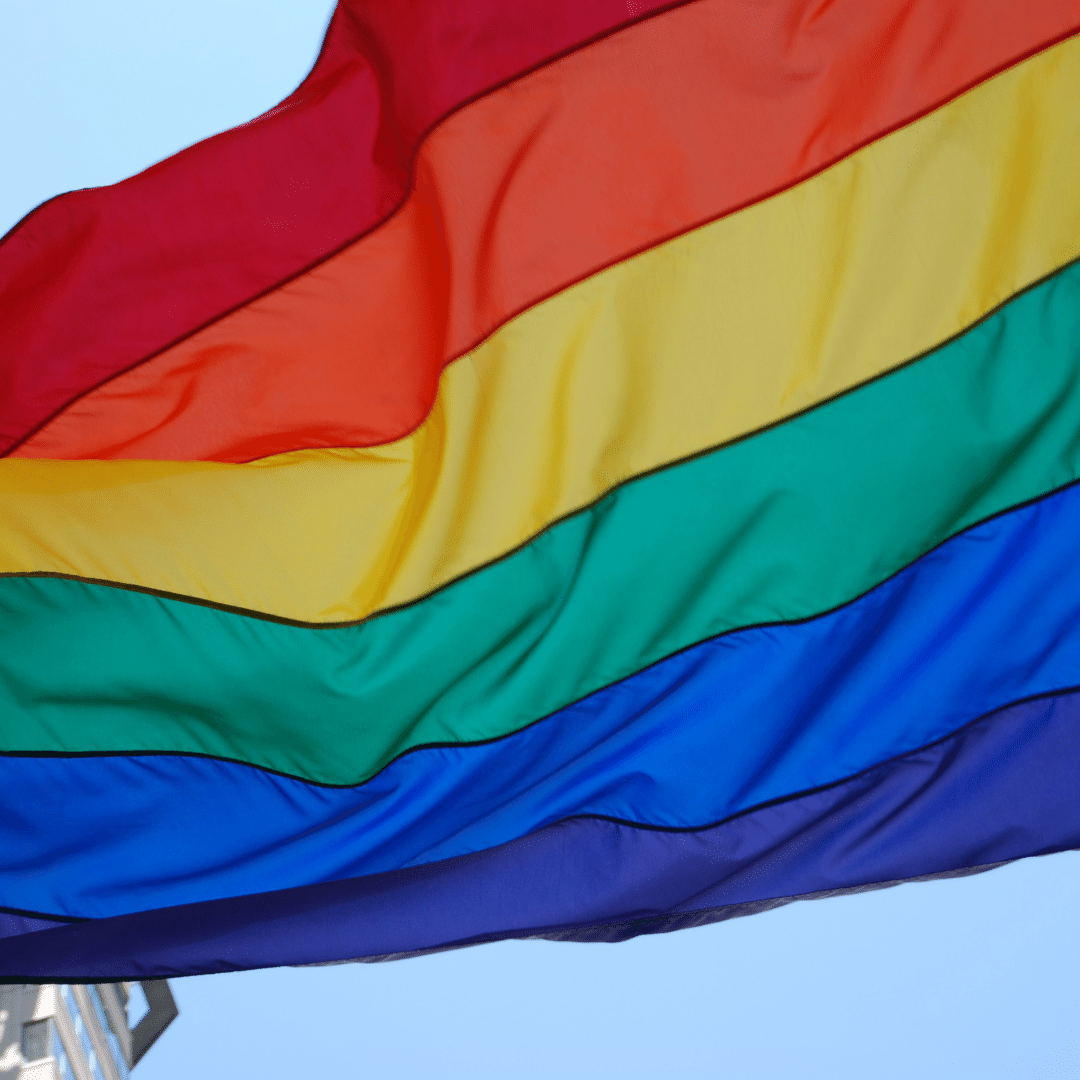
A report from the leading LGBTI organisation in Europe finds that amid a rise in official anti-LGBTI rhetoric fueling a wave of hate crime in every country in Europe, there is a growing institutional resolve to tackle hatred and exclusion.
Published today, February 15, 2022, ILGA-Europe’s Annual Review of the Human Rights Situation of LGBTI people in Europe and Central Asia finds that while there was a staggering rise in 2021 of anti-LGBTI rhetoric from politicians and other leaders, fuelling a wave of violence, with anti-LGBTI hate crime reported in every country, the response to this has been an allied determination in many countries, and at the European level, to tackle hatred and exclusion of LGBTI people.
Politicians in countries across Europe, not just in the usually reported Hungary and Poland, have continued to demonise LGBTI people over the past year, leading to a stark rise in anti-LGBTI attacks, burning of rainbow flags, and targeting of young LGBTI people in particular. A particular low point of the year came on June 15, with Hungary’s introduction of legislation which introduced a ban on the “portrayal and the promotion of gender identity different from sex at birth, the change of sex and homosexuality” for persons under 18.
Reported violence against LGBTI people in this context across Europe was rife. Germany, for instance, had a 39% increase in anti-LGBTI hate crime, while a new app in France, where users can report anti-LGBTI hate crimes, collected reports of 3,896 incidents in its first year. In the second year of the COVID-19 pandemic, domestic violence against LGBTI family members continued to take place widely. There were murders, assaults, corrective rapes, and anti-LGBTI police brutality. In many countries where police brutality took place, the police were not held accountable.
Anti-gender and anti-trans rhetoric have remained widespread, often targeting youth in particular. The narrative pitching trans rights against women’s rights also continued apace this year, and in this context there was stagnation in legal gender recognition (LGR) reform in many countries.
According to Executive Director of ILGA-Europe, Evelyne Paradis: “The spread of anti-LGBTI and trans exclusionary rhetoric outlined in this report has a very real negative impact on people’s lives. In country after country, we see how it negatively impacts people’s mental health and their sense of safety, their access to employment and the overall ability to progress much needed legal protection. At this moment in time, it is essential we remind politicians, media, academics – and sadly even some civil society actors – that real people’s lives are at stake in every country across the region, because of the political scapegoating of LGBTI people.”
In the context of this political scapegoating, national human rights institutions (NHRIs) and courts in many countries have begun to strengthen their work to protect the rights of LGBTI people. The European Court of Human Rights delivered several positive judgments this year, on hate crimes, freedom of assembly, LGR and family rights.
By far the strongest commitment to LGBTI human rights from European Union level came when the European Commission (EC) in July opened landmark infringement procedures against both Hungary and Poland. The European Parliament also adopted its resolution on LGBTIQ rights in the EU, strongly supporting the EC’s objective to propose legislation in several areas of protecting LGBTI rights, and condemning where member states have not been respecting EU law as regards LGBTI rights.
Said Katrin Hugendubel, Advocacy Director at ILGA-Europe, “This report narrates an unparalleled year in Europe, with regional and national institutions and courts taking their obligations to the human rights of LGBTI people with utmost gravity amid the now crystal clear escalation of the instrumentalisation of hatred against LGBTI people for political gain and expanded power. The advance of using hatred of any minority as an instrument of political gain, which we have seen throughout history, must be addressed and halted with allied determination across the region.”
It is also clear from this report that state-sponsored anti-LGBTI rhetoric and legislation is not matched by public opinion. Support for LGBTI people has never been stronger. In Hungary, for instance, a representative poll commissioned by Amnesty International Hungary and Háttér Society and conducted by polling agency Medián between 13 and 19 July 2021, found that 73% of Hungarians reject the government’s false claim that gay and lesbian people abuse or harm children.
A clear majority of Hungarian society (74,5%) believe that transgender people should be able to change their gender and name in their official document, while 59% support same-sex marriage. Hardly any Serbians know trans people, but 60% think they should be protected from discrimination. 68% of Romanians think all families, including rainbow families, should be protected, while 40% of Bulgarians would support a party that is pro-LGBTI.
According to Soudeh Rad, co-chair of the ILGA-Europe board: “While these numbers and outcomes of similar polls are promising as heartwarming illustrations of the strength and impact of the work carried out by civil society and the LGBTI movement at global, regional, and local levels, we must not forget the struggles activists across Europe and Central Asia face in realising a world where everyone can enjoy their human right to fully be themselves.”
Check out our Annual Review 2022.
Navigate the Annual Review chapters by country, institution or theme at our Rainbow Europe module!
For further comment, please contact ILGA-Europe’s Communications and Media Officer Ana Muñoz Padrós at ana@ilga-europe.org or +32 493356055.
Annual Review 2022
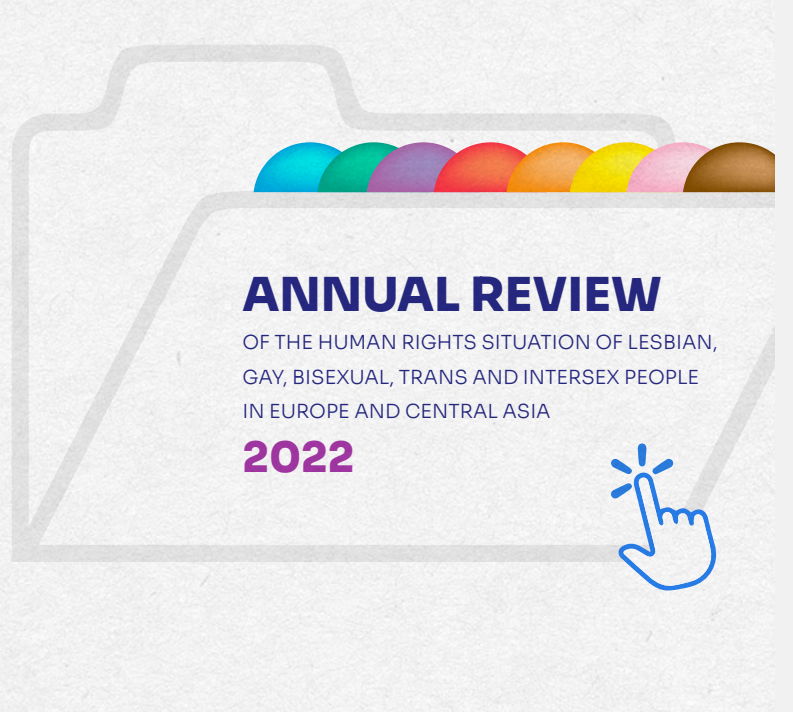
The Human Rights Situation of Lesbian, Gay, Bisexual, Trans and Intersex People in Europe and Central Asia between January-December 2021.
The Annual Review is ILGA-Europe’s annual publication documenting legal, political and social developments in 54 countries and 4 European institutions over the past calendar year. It is a unique report tracking key positive and negative trends in relation to LGBTI equality and human rights in Europe and Central Asia.
This year’s review finds that behind the smokescreen of anti-LGBTI rhetoric in Europe, there’s a groundswell of allied determination to tackle hatred.
The Frontline: Mapping LGBTI Rights in Europe
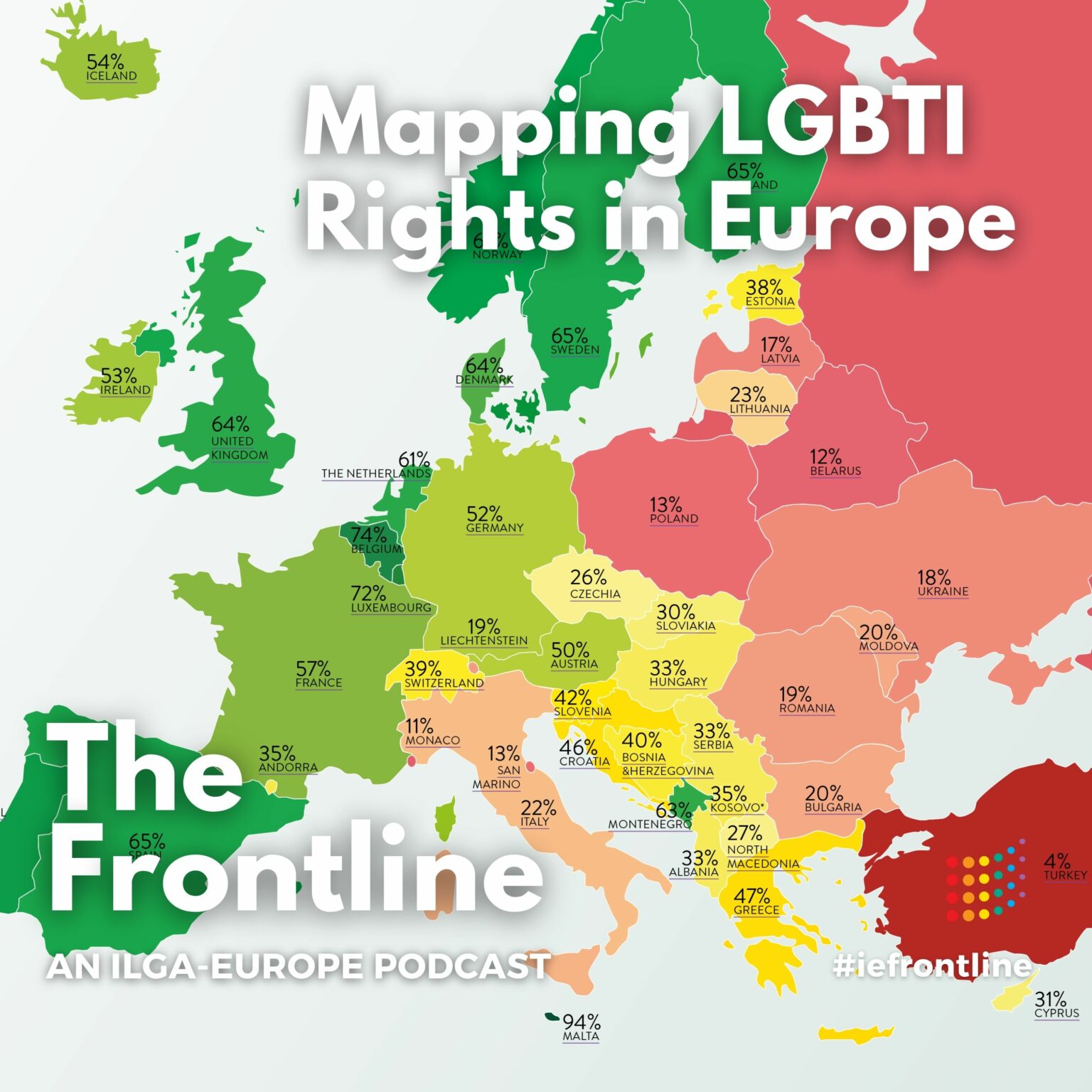
Every year, Rainbow Europe ranks all 49 European countries based on the laws and policies in each to ensure equal rights and protection for LGBTI people. Countries are ranked from zero percent to one hundred, with zero representing gross violations of human rights and discrimination and one-hundred representing full respect for human rights and equality.
The past 12 months have marked an unprecedented year in the map’s 12-year history, with almost no positive legislative change for LGBTI people in Europe. With us to discuss this disturbing stand-still, on both European and national levels, and the ways forward both at European and national levels, are ILGA-Europe’s Executive Director, Evelyne Paradis, our colleague, Bjorn Van Roozendaal, Alexa Moore from Transgender NI in Northern Ireland, Alexa Moore, and Kaspars Zalitis from Mozaika in Latvia.
Listen below or click here to listen and subscribe to The Frontline on your favourite podcast platform.
Time for a reboot on LGBTI rights in Europe as Rainbow Map reveals a disturbing stand-still
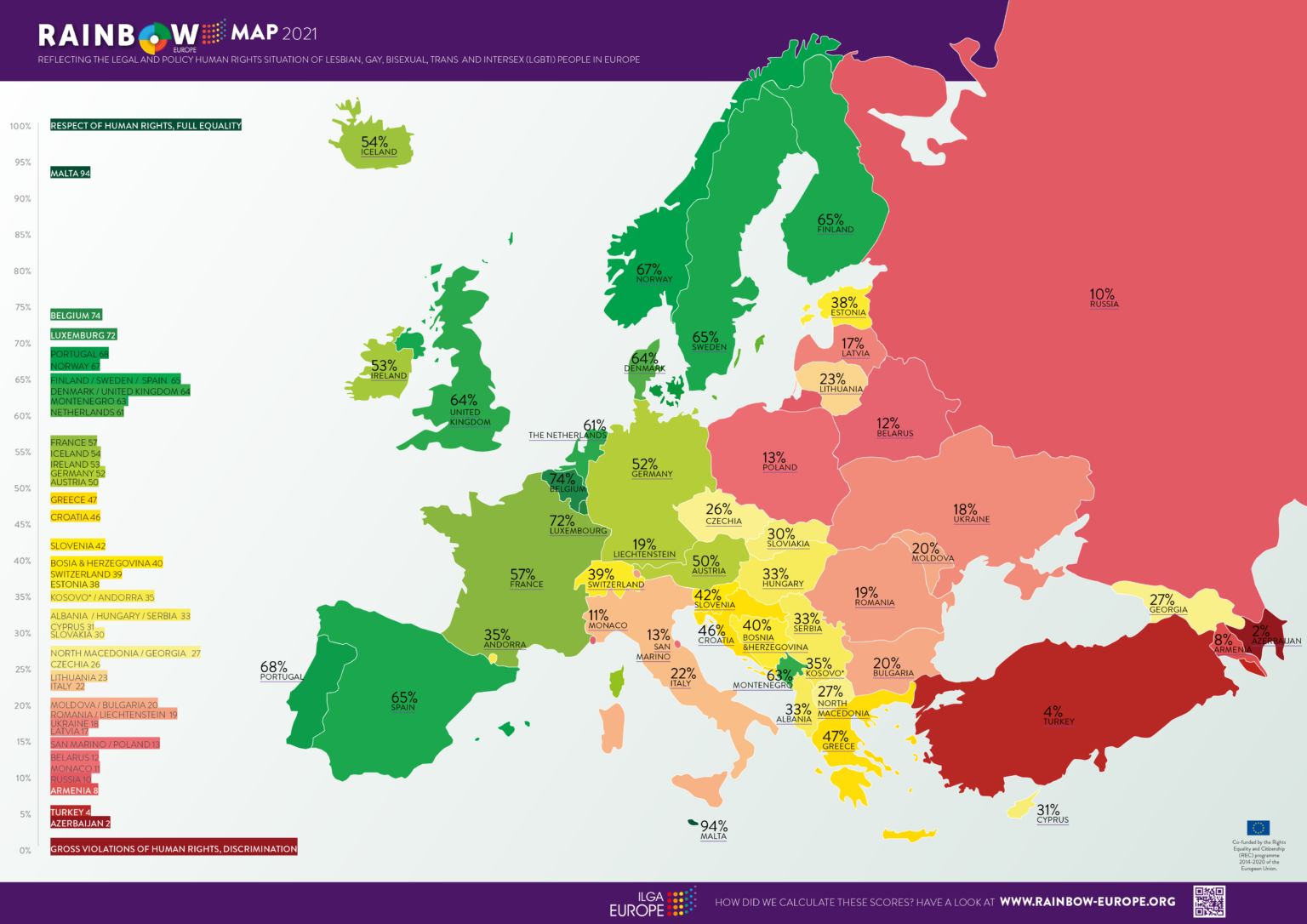
As the 2021 Rainbow Europe Map reveals widespread and almost complete stagnation on human rights of LGBTI people, we are at a juncture when governments can actively choose the right way forward, says leading LGBTI rights organisation, ILGA-Europe.
Published on Monday, May 17 2021, ILGA-Europe’s annual Rainbow Europe Map and Index, ranking the legal and policy situation of LGBTI people in 49 European countries, finds that over the past 12 months advances in LGBTI rights have come to almost a complete standstill. But, with legislative proposals and action plans on the table in some countries, governments now have the opportunity to ensure the Rainbow Map will look very different this time next year.
Released every year since 2009 on International Day Against Homophobia, Transphobia, Biphobia, and Intersexphobia (IDAHOBIT), the ILGA-Europe Rainbow Map ranks all 49 European countries on a scale between 0% (gross violations of human rights, discrimination) and 100% (respect of human rights, full equality). The past 12 months have marked an unprecedented year in the Map’s 12-year history, with almost no positive legislative change for LGBTI people in Europe.
Among the broad findings from this year’s Rainbow Europe Map are:
- Against a background of hardly any positive change at all, countries such as Albania, Finland and Portugal have moved up in the ranking, but only because of very small changes implemented.
- Despite clear commitments on rainbow family recognition, not one country has moved on partnership or parenthood recognition.
- After reporting positive changes in bodily integrity or legal gender recognition for many years, there is no change this year for intersex and trans rights apart from Iceland.
- On a positive note, some countries (Bosnia and Herzegovina, North Macedonia) now have points on freedom of assembly, reflecting improvements of safety for public LGBTI events
Executive Director of ILGA-Europe, Evelyne Paradis said: “It is deeply worrying to report an almost complete standstill on LGBTI rights and equality, especially at such a critical time for LGBTI communities. In the past year, we’ve seen increased political repression against LGBTI people, a stark rise in socio-economic hardship, and the spreading of LGBTI-phobic hatred on the streets and online across the region. Against this backdrop, the response from governments has to be more and better concrete action, to make sure people are more protected, not less. The human rights of LGBTI people simply cannot be something that you drop when circumstances are challenging.”
Katrin Hugendubel, ILGA-Europe’s Advocacy Director added: “So many legislative processes have been stalled in Europe over the past 12 months, in countries including Cyprus, Czechia, Denmark, Finland, France, Italy, Kosovo, Lithuania, Moldova, Montenegro, the Netherlands, Sweden, and the United Kingdom. We also see the implementation of existing procedures, for example on legal gender recognition, worsening, including in Georgia, Spain, Serbia and Northern Ireland”.
“It would be easy to blame it all on political attention being immersed in the public health response to COVID-19 and the ensuing economic fall-out, but the reality is a lot more complex. In too many countries, progress is stopped because there’s increased political polarisation on LGBTI issues, because some elected officials no longer see gains to be made by supporting LGBTI equality, and because governments don’t see it as a priority issue. We do really need governments across Europe to relaunch their political commitments to see legislative processes through, and to give everyone the means to ensure full implementation.”
Evelyne Paradis concluded: “There is a silver lining in this story: if governments actively choose to do the right thing and take real action, our Rainbow Map can look positively different by this time next year. At least 15 countries, including France, Kosovo, Bosnia & Herzegovina, Czechia and Ukraine, have legislative proposals, action plans and policy discussions already on the table. Others, such as Montenegro, have to make sure the laws they adopted effectively come into force, while many more know what they can and need to do to make sure their laws and policies have the desired impact for LGBTI lives.
“At a juncture in history when anti-LGBTI forces are rife, not only in headline-grabbing countries like Poland and Hungary, but across Europe, LGBTI people need all governments to seize this moment and make sure Europe remains a committed and active leader in the arena of human rights for everyone.”
Further information:
Executive Summary – Rainbow Europe Map & Index 2021
Rainbow Europe – ILGA-Europe’s annual benchmarking tool – comprises the Rainbow Map and Index and national recommendations. ILGA-Europe have produced the Rainbow Map and Index since 2009, using it to illustrate the legal and policy situation of LGBTI people in Europe.
The Rainbow Map and Index ranks 49 European countries on their respective legal and policy practices for LGBTI people, from 0-100%.
In order to create our country ranking, ILGA-Europe examine the laws and policies in 49 countries using a set of criteria. From May 2021, the number of individual criteria used has risen to 71, divided between six thematic categories: equality and non-discrimination; family; hate crime and hate speech; legal gender recognition and bodily integrity; civil society space; and asylum. More information on the list of criteria and their weight on the total score can be found at www.rainbow-europe.org/about
Rainbow Europe 2021 categories and the percentage ‘weight’ assigned to them remain exactly the same as the 2020 version. ILGA-Europe started assessing two new indicators: “Non-binary recognition” and “Legal gender recognition procedures exist for minors”. They are included under the category of legal gender recognition and bodily integrity; and the percentage ‘weight’ has been altered to accommodate these two new criteria.
Alterations to our criteria make year-on-year comparisons difficult, but certain lessons are clear – countries that are expanding their legislative horizons are moving up in the ranking.
Policymakers, researchers and journalists are able to go ‘behind’ the points and see the original information sources that we base our Map and Index ranking on. This additional layer of information is available through our updated Rainbow Europe web module, www.rainbow-europe.org.
The Rainbow Map and Index presents a picture of what the policy landscape is like currently, while our country-specific recommendations attempt to answer the question “what’s next?” These recommendations are intended to encourage policymakers to address the most pressing legal and policy priorities within the framework of our Rainbow Map and Index. The recommendations were gathered following an online consultation with a wide range of LGBTI organisations in the various countries. As a result, the recommendations are tailored to the needs of activists working on the ground.
For the sixth year in a row, Malta continues to occupy the number one spot on the Rainbow Europe Map, with a score of 94
Belgium comes second place for the fourth time with a score of 74%.
Luxembourg receives 72 points and occupies the third spot on the ranking for the third year in a row.
The three countries at the other end of the Rainbow Europe scale are Azerbaijan (2%), Turkey (4%), and Armenia (8%), exactly the same as last year.
Denmark is the country with the most dramatic drop in its score, losing 3.80% points in relation to the irregularities for the criterion on depathologisation, with access to trans-specific healthcare still linked with a mental health assessment in the country.
Georgia has also dropped by 3.73% due to the lack of clear procedure for legal gender recognition and the risky situation of LGBTI human rights defenders in the country.
Another important deduction happened, with Ukraine losing 3.5% points due to the expiration of the government’s action plan.
Malta, North Macedonia, and Bosnia & Herzegovina are the three countries with the biggest jump in scores. Malta added sex characteristics under protected grounds in the Refugees Act and published new policy guidelines for LGBTI asylum claims. Malta also received points in relation to ILGA-Europe’s new indicators (“Non-binary recognition” and “Legal gender recognition procedures exist for minors”).
North Macedonia and Bosnia & Herzegovina had a big jump in their scores and rankings, due to the fact that freedom of assembly has been improving in both countries.
Equality and non-discrimination
Equality action plans have expired in Albania, Norway, and Ukraine, while France and Kosovo have shortcomings and implementation problems with their action plans. Finland, Ireland, Sweden, and Germany’s Saarland region’s action plans were the only new ones that received points this year. Governments in Bosnia & Herzegovina, Czechia, and Ukraine are in the process of preparation of their next action plans.
Albania included sex characteristics protection in anti-discrimination legislation. The region of Cantabria in Spain introduced a new anti-discrimination law protecting on the ground of sexual orientation, gender identity, and sex characteristics. A court in Poland clarified that law prohibits discrimination based on gender identity at workplace.
Portugal and Northern Ireland (UK) revoked all restrictions on LGBTI people for blood donation, making it possible for everyone to donate blood safely and equally. Ukraine announced a similar change, but it hasn’t been enacted yet.
Family
Recognition of family legislation is stagnating across Europe. This year, there was no single legal or policy change affecting LGBTI people.
Hate crime and hate speech
Norway was the only country to extend legal protection from hate crime, amending its Penal Code to add gender identity ground.
Legal gender recognition and bodily integrity
Since 6 January, 2021, legal recognition for non-binary people has been implemented in Iceland, making it the only country in Europe to advance trans rights in the last 12 months.
Trans-specific healthcare became almost impossible to access in Northern Ireland. Activists’ reporting has revealed that trans people are unable to access the medical reports required to go through these processes without paying for private care, thus creating a class barrier to accessing LGR.
Civil society space
North Macedonia and Bosnia & Herzegovina have had no state obstruction of freedom of assembly within the past three years and Pride events were adequately protected by police.
Poland’s civil society space has shrunk more this year, because people are being actively attacked by the police during public events, instead of being protected. Poland also lost points related to freedom of expression, due to the anti-LGBT resolutions that have been passed by local governments.
The other country with a negative trend in this regard is Georgia, which lost points with LGBTI human rights defenders at risk, due to a large number of attacks over the last 12 months.
Asylum
Malta introduced new amendments to the Refugees Act and published new guidelines on asylum claims. This was only development regarding protection of LGBTI asylum rights in the last 12 months.
Finland’s policies regarding LGBTI asylum seekers were criticised by LGBTI civil society for being only project based and not creating any systematic approach or policy. Points were deducted by ILGA-Europe from Finland, based on this report.
The lived realities of LGBTI people in every single EU country show that it’s not yet an LGBTIQ Freedom Zone
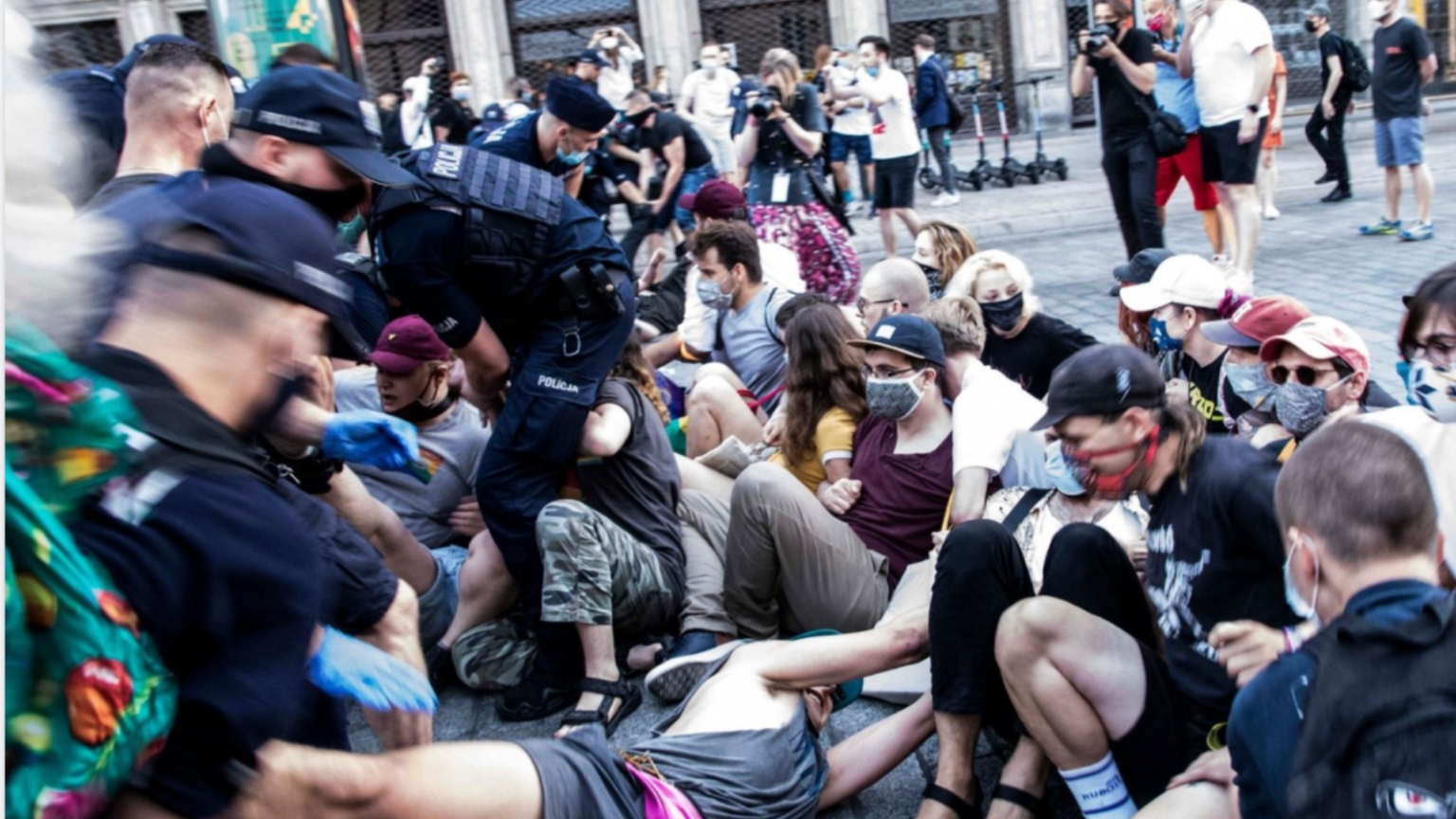
The EU is now an LGBTIQ Freedom Zone, as declared by the European Parliament. This is great news, but real action must be taken to make this a lived reality for LGBTI people across the EU.
On 11 March 2021, in response to the proliferation of over 100 so-called ‘LGBT-Free zones’ in Poland, the European Parliament voted and declared the EU an LGBTIQ Freedom Zone. While it’s a strong symbolic gesture, this will not have any positive impact in LGBTI people’s lives unless it’s followed by meaningful actions and measures at EU and national levels.
Across the EU, we are witnessing a stark rise of hate against LGBTI people. In our recently published Annual Review, we reported an increase of hate speech from political, religious leaders and on social media in several countries of the region. Additionally, the COVID-19 crisis has made vulnerable communities even more vulnerable.
It’s not only in Poland and Hungary that LGBTI people and communities need protection. Earlier in March, a gay man was murdered in Beveren, Belgium, having been lured via a dating app to a park, where he was attacked by three teenagers. Declaring the EU an LGBTIQ Freedom Zone is not enough: this strong statement must be followed by actions that bring real change to LGBTI people and communities in the region.
Here is how LGBTI people’s lives are negatively affected in every single member state of the European Union:
Austria
There is no protection against hate speech or hate crimes based on gender expression, gender identity and sexual characteristics.
Belgium
Hate and violence are on the rise. A gay man was brutally murdered on March 6 in Beveren. Three teenagers allegedly stabbed him to death after luring him into a fake date arranged on a dating app.
Bulgaria
Children of a same-sex couple can lose one parent just by crossing an EU border. A child of a same-sex couple is currently at risk of statelessness as Bulgarian authorities have not recognised the baby’s valid EU birth certificate.
Croatia
There is an increase of hate speech and violence. In February 2020, an effigy of two men kissing and a child was burnt at a festival, weeks after the country’s highest court ruled that same-sex couples could become foster parents.
Cyprus
The reform of legal gender recognition has been stalling for years now.
Czechia
Sterilisation is required to access legal gender recognition. A case law from the European Court of Human Rights on the matter has been waiting for years now to be implemented.
Denmark
The country failed to ban unnecessary surgeries and treatment on intersex infants and minors, despite multiple United Nations’ recommendations.
Estonia
Attacks on civil society have increased. Despite recommendations from the UN Human Rights Committee in 2019, no progress has been made to include sexual orientation and gender identity in the hate speech and hate crime legislation.
Finland
Trans people are required to be sterilised before accessing legal gender recognition.
France
The number of hate crimes against LGBTI people increased in 2020, for a fourth consecutive year, according to SOS Homophobie. Two LGBTI children, who were bullied at their schools, committed suicide.
Germany
Same-sex couples cannot adopt. Legal gender recognition legislation is outdated and its reform has been stalling for years.
Greece
The latest amendments to immigration legislation have restricted the rights of LGBTI asylum seekers. In January 2020, a booklet was distributed by the Church in the Athens Holargos high school, saying that being “homosexual” is a “hateful act” and that LGBTI people were “traitors” and “murderers”.
Hungary
The Hungarian Parliament banned legal gender recognition in May 2020. The following December, it also voted to abolish the Equal Treatment Authority, Hungary’s most important equality body. Bookshops selling the children’s book ‘Wonderful is for Everyone’, which depicted diverse families and characters, were labelled as promoters of homosexuality and their staff were threatened. Prime Minister Viktor Orbán commented on the book saying that homosexuals should “leave our kids alone”.
Ireland
The country witnessed deeply worrying cases of hate crime and violence. A young gay couple was beaten up and stubbed in Kildare in February 2020. In September, a video on social media showed ten students from a Dublin private school verbally assaulting a classmate who had recently come out.
Italy
There is no legal protection against discrimination outside the labour market on the grounds of sexual orientation and gender identity.
Latvia
In January 2021, the Latvian Parliament started examination of the constitutional amendment seeking to restrict the extension of the concept the concept of family. The country does not recognise same-sex partnerships and still requires trans people to be sterilised before having access to legal gender recognition
Lithuania
Partnership is not recognised. Politician and LGBT rights activist, Tomas Vytautas Raskevičius (Liberty Party) secured a seat in parliament during the autumn elections. When he wanted to be chair of the human rights committee, he was received with homophobic hate and threats.
Luxembourg
In July 2020, the town of Esch-sur-Alzette announced it would prohibit shared flats if those cohabiting are not relatives or partners, which would forcefully out many same-sex couples and could be used in a discriminatory manner.
Malta
The Equality Act has not been implemented yet.
Netherlands
Schools have the right to ask parents to sign a statement rejecting a homosexual lifestyle, as long as the school ensures a safe environment for all pupils. During the summer, over 60 cases of discrimination and violence against LGBTIQ asylum seekers were reported.
Poland
In Poland, over 100 towns have declared themselves ‘LGBT-free zones’. Officially led hate speech and scapegoating of LGBTI people continue to be on the rise. In August 2020, 48 people protesting the detention of LGBTI activist Margot Szutowicz were also arrested. Partnerships are not recognised.
Portugal
There is no legal protection against discrimination outside the labour market on the grounds of sexual orientation and gender identity.
Romania
The CJEU judgement in the Coman case, which three years ago established that same-sex spouses are fully recognised as spouses under the EU freedom of movement directive, has to this day not been enacted by the Romanian state, and the partner of Adrian Coman still has not been granted a residence permit in Romania, leaving other same-sex couples in similar situations in limbo. There is no partnership recognition and trans people are still required to be sterilised before having access to legal gender recognition.
Slovakia
The country still requires trans people to be sterilised before having access to legal gender recognition.
Slovenia
Non-governmental organisations in Slovenia are increasingly targeted by the government’s restrictive measures and hostile rhetoric. Leading the government, the radical right Slovenian Democratic Party and PM Janez Janša direct their hostility especially towards NGOs engaged in independent cultural production and defending human rights, media freedom and the environment.
Spain
There are very harmful debates at the moment around the Trans Law. A group of trans people and their families are on hunger strike since March 2021. They will continue until the proposed legislation is debated at the Spanish House of Representatives.
Sweden
At the initiative of the right wing populist party Sweden Democrats, the municipality of Hörby put forward a new policy banning raising the rainbow flag on municipal flagpoles. The local church responded by displaying the rainbow flag on their flagpole. The policy was later withdrawn, but follows a similar and successful ban passed in 2019 in Sölvesborg.
The Frontline: LGBTI communities in Europe: Pushed to the brink
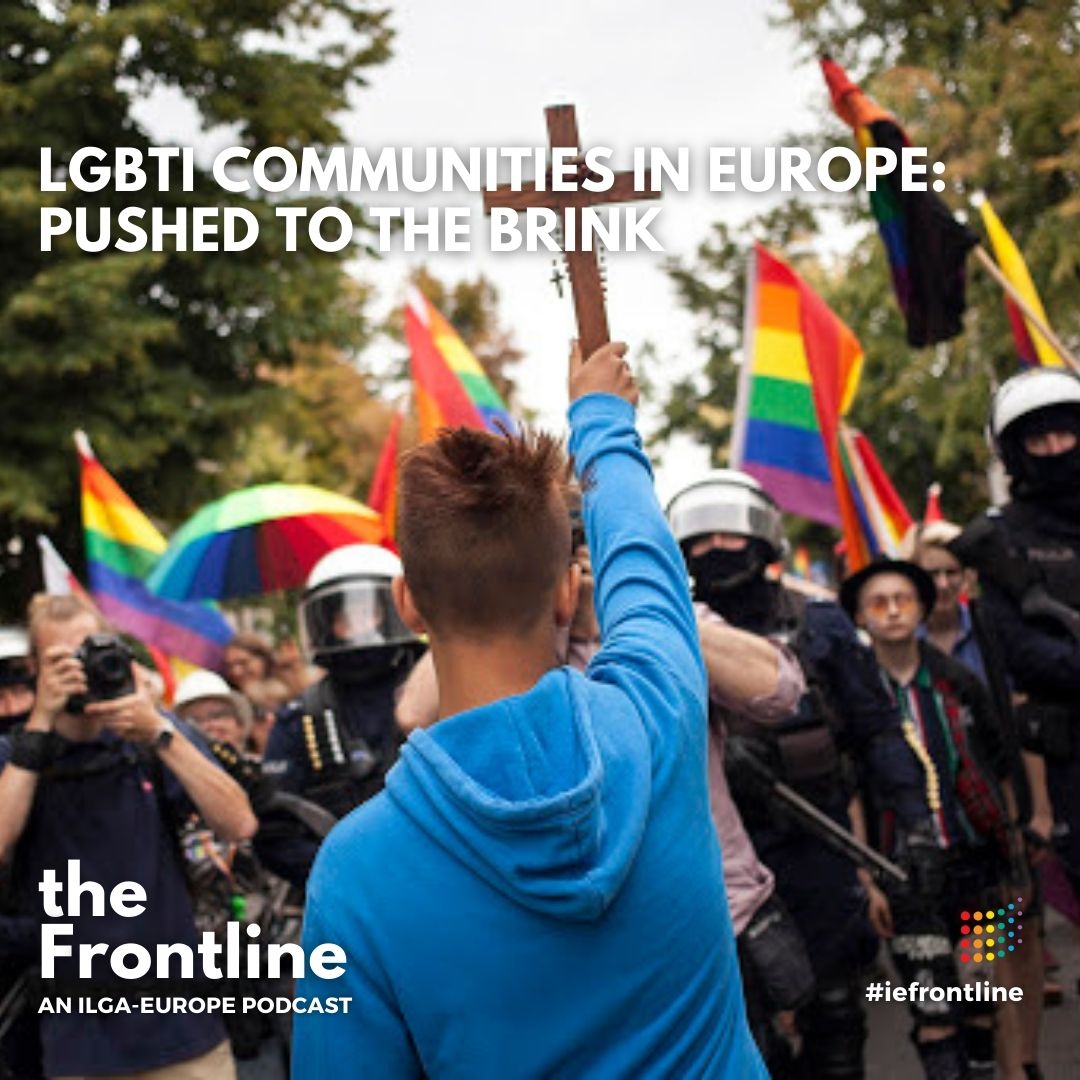
Reporting from country after country provides a glaring clarification that progress which has been taken for granted is not only increasingly fragile, but particularly vulnerable to exploitation by anti-human rights forces.
In this episode of The Frontline, we get an overview of the stark situation from ILGA-Europe’s Advocacy Director, Katrin Hugendubel. Executive Director of Transgender Europe (TGEU) talks to us about the significant growth of opposition towards trans rights across Europe; and Executive Director of ILGA-Portugal, and Marta Ramos tells us about the rise of the anti-gender movement in her country, and the ways in which LGBTI organisations have had to skew their work during the COVID-19 pandemic towards provision of basic necessities like food and shelter as many governments left LGBTI people out of their relief packages.
Listen below or click here to listen and subscribe to The Frontline on your favourite podcast platform.
ILGA-Europe’s Annual Review finds that LGBTI people and communities have been pushed to the brink
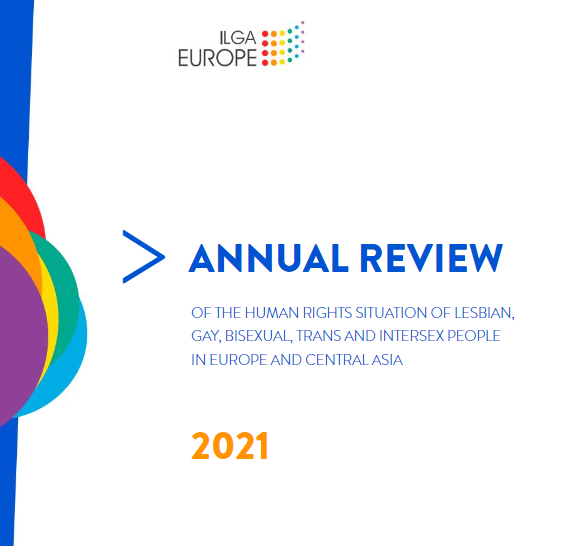
The ILGA-Europe Annual Review of the Human Rights Situation for LGBTI People in Europe and Central Asia contains a stark message that progress which has been taken for granted is not only increasingly fragile, but particularly vulnerable to exploitation by anti-human rights forces. Read on for our 10 key findings.
2020 has been an extraordinary year. Our tenth Annual Review of the Human Rights Situation of LGBTI People in Europe and Central Asia confirms that the COVID-19 pandemic has disproportionately impacted already vulnerable LGBTI communities.
Our Annual Review covers the events and developments for LGBTI rights and people over a twelve-month period in 54 countries from Andorra to Uzbekistan. It also covers a wide range of themes, including asylum, hate speech, freedom of expression, legal gender recognition, and many more. You can check it out at our website or navigate interactively across chapters in the Rainbow Europe module.
The 10 Key Findings:
1. There has been stark rise in hate speech
In country after country, we see a disturbing rise in abuse and hate speech against LGBTI people, many who became vulnerable to homelessness have been forced to move back in to hostile family and community situations because of the COVID-19 pandemic.
2. LGBTI organisations have done the job of governments during the pandemic
In 2020, LGBTI organisations have had to skew their work towards provision of basic necessities like food and shelter as many governments left LGBTI people out of their relief packages.
3. Hostility towards trans people is reaching new heights
There is a significant growth of opposition towards trans rights and this is beginning to have a wide and negative impact on legal gender recognition. There is legal regression and stagnation in 19 European and Central Asian countries, many of which have seen opposition forces become louder, saying that advancing the protection against discrimination and self-determination for trans people would harm women’s rights or ‘the protection of minors’.
4. LGBT people are being used as scapegoats
There has been a resurgence of authorities and officials using LGBT people as scapegoats, while authoritarian regimes are empowered to isolate and legislate without due process.
5. We are witnessing a crackdown on democracy and civil society
Overall there has been a crackdown on democracy and civil society, and not just in Poland and Hungary, which made all the headlines in 2020. We are seeing this in Turkey, Azerbaijan, and across Central Asia, while activists in several countries report fears of following in Poland and Hungary’s footsteps.
6. Attacks on freedom of assembly continue to be a growing trend
Due to the COVID-19 lockdowns, Prides have been cancelled all across Europe. The absence of Pride events matters not just as a test of free assembly, but because of the potential longer-term impact on the visibility and presence of LGBTI people and communities in the public space. In addition, attacks on freedom of assembly continue to be a growing trend with brutal crackdowns and legal challenges.
7. Family rights are shifting
Although there is stagnation of same-sex partnership registration or marriage rights in several countries, Montenegro became the first Western Balkans country to introduce civil partnership; while in Serbia the government promised steps toward introducing civil partnership in 2021. However, the growing trend across the region is that more countries are moving on parenthood rights rather than partnership rights, and paying more attention to the protection of children’s rights, shifting the focus away from LGBTI rights.
8. The way we define progress is evolving
In the last five years there’s been legislative progress in a lot of countries, but in too many places we’re still waiting for those laws to translate into real change in the lived experience of LGBTI people. Also, more people are turning to the courts for the recognition of their human rights, or for the clarification of existing legislation that is meant to protect them.
9. Intersectionality is under-reported
While many people within the movement are talking about intersectionality, and taking steps to work on intersecting inequalities that affect LGBTI people, very few groups articulate their commitment to intersectionality in the public sphere. For example, while we know from our work that many LGBTI activists took part in the Black Lives Matter (BLM) demonstrations in 2020, few connect their support to the BLM movement to their own work, for example on police violence against LGBTI people.
10. Awareness is growing at an institutional level
Many courts and governmental institutions are beginning to have a larger awareness of growing negative trends. It was important in 2020 to see the European Commission resetting its commitment to protect and advance LGBTI rights with the EU LGBTIQ Strategy 2020–2025.
Annual Review 2021

The Human Rights Situation of Lesbian, Gay, Bisexual, Trans and Intersex People in Europe and Central Asia between January-December 2020.
The Annual Review is ILGA-Europe’s annual publication documenting legal, political and social developments in 54 countries and 4 European institutions over the past calendar year. It is a unique report tracking key positive and negative trends in relation to LGBTI equality and human rights in Europe and Central Asia.
This year’s review shows that as a result of the unprecedented events of 2020, LGBTI people and communities in Europe have been pushed to the brink.
ILGA-Europe’s 10th Annual Review shows that as a result of the unprecedented events of 2020, LGBTI people and communities in Europe have been pushed to the brink
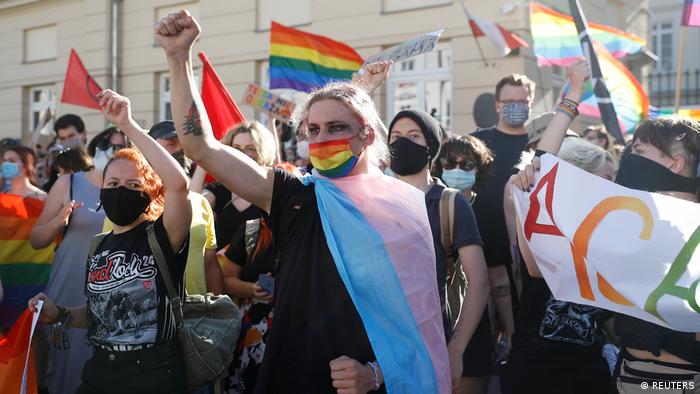
After an extraordinary year, Europe has been awoken to the acute fragility of the human rights situation for LGBTI people across the region, says ILGA-Europe.
Reporting from every country in the ILGA-Europe ‘Annual Review of the Human Rights Situation of LGBTI People in Europe and Central Asia 2021’ is a glaring clarification that progress which has been taken for granted is not only increasingly fragile, but particularly vulnerable to exploitation by anti-human rights forces.
According to Evelyne Paradis, Executive Director of ILGA-Europe: “Our Annual Review shows that the COVID-19 pandemic has highlighted all of the gaps in terms of lived realities of LGBTI people across Europe and Central Asia. In reports from country after country, we see a stark rise in abuse and hate speech against LGBTI people; many of whom became vulnerable to homelessness have been forced to move back into hostile family and community situations. LGBTI organisations have had to skew their work towards provision of basic necessities like food and shelter as many governments left LGBTI people out of their relief packages; and there has been a resurgence of authorities and officials using LGBT people as scapegoats while authoritarian regimes are empowered to isolate and legislate without due process.”
Overall there has been a crackdown on democracy and civil society, and not just in Poland and Hungary, which made all the headlines in 2020. Contributors to the Review in several countries have expressed fears of their governments following in the footsteps of Poland and Hungary, while attacks on freedom of assembly continue to be a growing trend with brutal crackdowns and attacks, and court cases against people who took part in Pride events in 2019. Concurrently the Review shows a substantial rise in hate speech across the regions, both from official sources, in the media and online. The trend of politicians verbally attacking LGBTI people has grown considerably and spread widely, while many religious leaders have directly blamed LGBTI people for COVID-19.
Says Katrin Hugendubel, Advocacy Director at ILGA-Europe: “In this worrying context, it was important in 2020 to see the European Commission resetting its commitment to protect and advance LGBTI rights with the EU LGBTIQ Strategy 2020-2025, and the Commission President finally finding very clear words condemning persistent discrimination and ongoing attacks on LGBTI people. These are steps in the right direction, but they need to be followed by similar actions at national level, and the Strategy needs to be meaningfully implemented.”
The ILGA-Europe Annual Review 2021 shows a significant growth of opposition towards trans rights across Europe, which is beginning to have a wide and negative impact on legal gender recognition. There is legal regression and stagnation in 19 countries, many of which have seen opposition forces become louder, saying that advancing the protection against discrimination and self-determination for trans people would harm women’s rights or ‘the protection of minors’.
For much of this annual report’s ten years, reporting on family rights has generally focused on same-sex partnership registration or marriage rights and in this context there continues to be stagnation in several countries. However, markedly in 2020, Montenegro became the first Western Balkans country outside the EU to introduce civil partnership; while in Serbia the government promised steps toward introducing civil partnership in 2021. We also see a growing number of countries moving on parenthood rights and paying more attention to the protection of children’s rights.
Evelyne Paradis concludes: “With this review, our message to governments and institutions is that we have to acknowledge how fragile the situation is for LGBTI people across Europe and Central Asia. It is essential to take bold and decisive action at multiple levels, so that the human rights of LGBTI people in all their diversity will continue to advance across the region, and the promise of equality will be experienced in their lived realities.”
Check out the Annual Review 2021 on our website.
Navigate the Annual Review chapters by country, institution or theme in our Rainbow Europe module!
For further comment, please contact ILGA-Europe’s Media Office, Ana Muñoz Padrós at ana@ilga-europe.org or +32 493356055.
How official anti-LGBTI hate speech is directly translating into hate crime across Europe
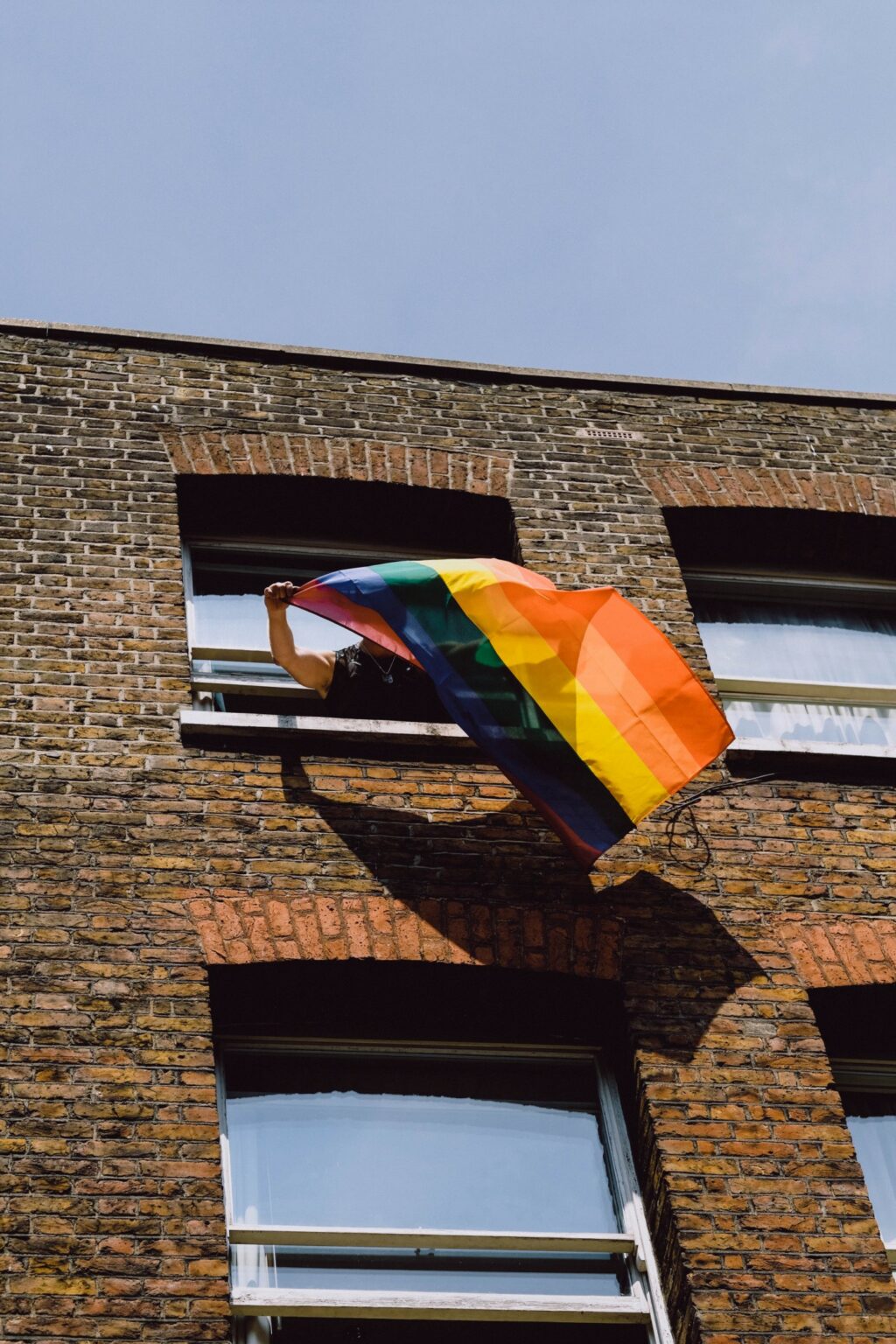
ILGA-Europe’s Annual Review identifies a sharp rise in anti-LGBTI hate-speech across the European region, often carried out by public figures. To mark European Day for Victims of Crime (February 22), we report on the ways in which such rhetoric is in turn violently affecting the lives LGBTI people.
Throughout 2019, there was sharp increase in physical attacks on LGBTI people across the European region, many of the latter premeditated and brutal. There was also an increase in attacks on LGBTI centres and gatherings. This isn’t only in countries where official hate-speech is on the rise, like Poland, Romania or Spain. An increase of hate crimes against LGBTI people is a pan-European phenomenon we have identified in our Annual Review 2020, which analyses trends and developments in the human rights situation of LGBTI people across 54 countries.
Brexit, for instance, and the populist narrative surrounding it, can be linked an increase in anti-LGBTI hate crimes and incidents in England and Wales from 5,807 in 2014–15, to 13,530 in 2018–19. The banning of events in Armenia, Hungary, Poland, Russia, and Turkey, and the prosecution of participants in Pride events in the latter, add to an atmosphere lacking in a sense of safety. In the Polish city of Lublin, a couple was arrested for bringing an explosive device to the Pride march.
There has also been the growing presence of anti-LGBTI, anti-gender and neo-Nazi protesters in public spaces during events such as Pride parades and film screenings. In several cities LGBTI centres were targeted with graffiti and other such attacks.
To mark European Day for Victims of Crime (February 22), here are examples of the many hate crimes documented in 2019, across the region:
Albania
On 12 November, a homeless trans woman who participated in the Dyke March, was brutally attacked by five men. The President of Albania condemned such “cowardly acts” and asked for the perpetrators to be brought to justice.
Armenia
On 20 June, 11 LGBT activists were verbally abused by four men in a park in Yerevan. The victims called the police, who told the activists to leave the park and took the four men to the police station. The investigation is ongoing.
Azerbaijan
Hate crimes against the LGBT community continued to be a serious issue in 2019. On 1 April, at least eight gay men and trans sex workers were detained by the police in Baku, signaling a new wave of arrests of LGBTQ people. On 2 April, a gay sex worker became a victim of extortion, theft, and blackmail in Baku and the perpetrator was detained. On 28 June, five trans women were physically assaulted by a group of 15 on a beach in Mardakan, four of the attackers have been arrested. On 6 July, a trans person was attacked outside a club while waiting for a taxi. The case was not reported to the police. In September, a gay man was beaten, harassed, and expelled from his village by his family for “dishonouring” them. The man reported the violence and a rape he was victim of last year.
Belarus
On 24 August, filmmaker Nikolai Kuprich and two friends were beaten up in a homophobic attack in Minsk.
Bosnia and Herzegovina
On 2 February, a lesbian couple was verbally assaulted and threatened with a knife and three days later were physically attacked by the same man and his friends. The violence was presumed to be linked to heightened homophobia ahead of the country’s first Pride march.
Bulgaria
Examples of documented hate crime include physical assault against two lesbians in January and February, and two gay men in Plovdid and in Varna. Five attacks were carried out against the LGBTI community centre, Rainbow Hub in the spring.
Cyprus
In February, a gay man was attacked in Nicosia. Despite multiple witnesses, the police failed to establish it was a hate crime. Another gay man was attacked by three men in a cruising area in Nicosia on 24 June. The case was reported to the police, who failed to take action.
Georgia
In June, renowned homophobe and public figure Levan Vasadze announced that self-organised groups, equipped with wooden clubs, would patrol Tbilisi to prevent Pride events. The Ministry of Interior stated that calling for the creation of such groups is illegal. However, no legal action was taken.
Greece
On 11 March, the building housing the Checkpoint Prevention and Examination Centers was targeted by a homophobic arson attack. The Checkpoints provide free HIV testing to vulnerable groups. On 2 September, two gay men were verbally harassed and physically assaulted by police officers.
Hungary
In March, Mi Hazánk live-streamed the disruption of a discussion on LGBTQI Roma people in Szeged. A day after Budapest Pride Festival opened extremists posted “Stop the Fag Propaganda” stickers outside the Auróra community space, Budapest Pride’s headquarters. Similar attacks were carried out in June, September and October. A participant of this year’s Budapest Pride March was spat on and kicked in the stomach after the event. In August, a girl was beaten up in Bénye for carrying a rainbow bag.
Iceland
In June, Candice Aþena was on her way home in Reykjavík when the men approached her, and after realising she was trans, kicked her in the face. This is not the first time Candice has been harassed.
Italy
Numerous hate crimes against LGBT people were documented in 2019, including two murders in May and June.
Luxembourg
Jean-Baptiste Pouthas, a French gay man was attacked in the Gare district of Luxembourg after a Pride party in July. Despite calling out for help, none of the passerby came to his rescue.
Montenegro
On 28 August, a trans man was attacked in Kolašin. The attackers went to the man’s house and when he answered the door, beat, insulted and humiliated him until he lost consciousness. The case was reported and police have arrested three suspects.
Portugal
In February, a lesbian couple was verbally and physically assaulted in Costa da Caparica. The couple called the police, who failed to show up. In July, a young trans man was targeted by physical and verbal violence in Coimbra, twice within a few days. The attack was reported to the police. In September, a gay couple was verbally and physically assaulted in downtown Lisbon. The police were nearby and identified the perpetrators, but let them go.
Romania
Two trans women were sexually and verbally harassed, and later physically assaulted on 8 June in Sibiu. The women were approached by a man in a club, who later physically assaulted them in a second club. No one intervened to defend the women, while they were being beaten. They fought back and reported the violence. The case is currently pending, the victims have not heard back from the police
Russia
Hate crimes against LGBTI people, including murder, physical violence and extortion were committed again this year. The authorities failed to classify them as anti-LGBTI hate crimes. In February, a court in Tatarstan sentenced a man to one year in prison for physically attacking a teenager who he thought was gay.
Serbia
Belgrade’s Pride Information Centre was attacked four times since December 2018. Although the police were informed of the possibility of one of the attacks in October, they did nothing to prevent it. On 24 June, a lesbian couple was harassed at the Engineering Students’ Club (KST). The security staff refused to protect them, saying they were to blame and should not have kissed.
Slovenia
On the morning of 1 November, one of Slovenia’s few LGBTI spaces, Tiffany Club in Ljubljana, was violently attacked by a group. In October, a gay man was beaten up in Murska Sobota.
Spain
A trans sex worker was brutally murdered by a client in Avilés on 21 September. Gay men were verbally harassed, threatened and assulted in Barcelona, Tenerife, and Valencia. On 19 December, politician Ángel Vázquez suffered a homophobic attack in Burjassot.
Switzerland
An increasing number of violent incidents, primarily against gay men, were reported this year, including an attack against an information stand at IDAHOT, May 17, and a gay couple being attacked on their way home from Pride in June. Both cases happened in Zurich.
Turkey
Several trans woman were victims of murder this year. Hande ?eker was murdered by a police officer in Izmir on 9 January; Gokce Saygi was killed in her home in Antalya in May; Defne was killed in her house in Afyonkarahisar in June. Court cases are ongoing. A group of trans women were attacked in a park in Antep in June and were then detained and verbally abused by police officers.
United Kingdom
On 30 May, a female couple was attacked by a group of men in London. The case went viral after the victims posted a picture of their injuries. London’s mayor, Sadiq Khan, and then Prime Minister Theresa May condemned the attack.
Charting a sharp rise in anti-LGBTI hate speech across Europe
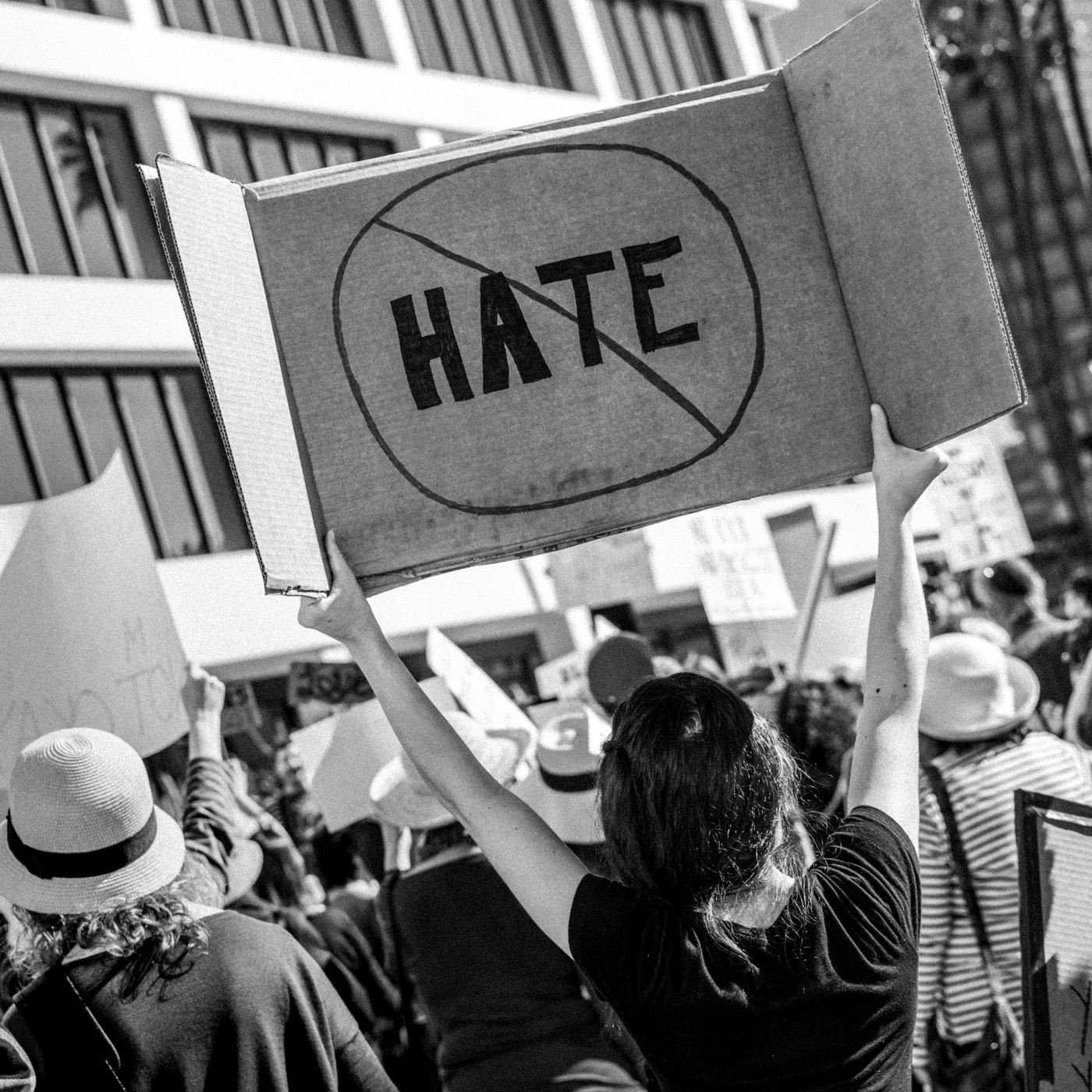
While this week Switzerland made hate speech illegal against people based on their sexual orientation, in 2019 one of the trends observed in ILGA-Europe’s Annual Review is a sharp rise in on-and-offline anti-LGBTI hate speech, often from political leaders, across Europe. As our Executive Director, Evelyne Paradis, recently shared at the Google Online Safety Summit, “LGBTI communities need to know that perpetrators of violent speech will be held responsible”.
Our current Annual Review, which was launched at the European Parliament on February 4, identifies trends and developments in the human rights situation of LGBTI people across Europe. One of these trends is a sharp rise in hate speech across the region, often carried out by public figures. One of the cases which received the most media attention was in Poland, where anti-LGBTI rhetoric by the governing Law and Justice (PiS) Party resulted in more than 80 municipal or local governments proclaiming themselves to be “free from LGBTI ideology”.
However, while much of the public and political attention was focused on Poland, ILGA-Europe’s Annual Review 2020 identifies growing official hate speech from political and religious leaders in other countries, where anti-LGBTI rhetoric was propagated with impunity. In most Central Asian countries, including some where LGBT people continue to be criminalised, there are reports of official hate-speech. Here is what we found:
Albania
In October, MP Kujtim Gjuzi (Conservative Party) publicly threatened LGBT people on a prime time political show on RTV Ora. The host also made negative statements. Both cases were reported to the Council of Complaints at the Albanian Media Authority, which issued a warning, but did not impose a fine on the channel.
Andorra
In August, Naira Nahapetyan, a member of Yerevan’s Municipal Council boasted online about attacking LGBTI people. Comments on the post incited violence against LGBTI people.
Azerbaijan
In February, Aynur Sofiyeva, Deputy Chairperson of the State Committee for Family, Women and Children Affairs, made homophobic remarks at an event, criticising the West for trying to impose same-sex marriage on others.
Belarus
In July, Dmitry Tsayun, official of the Ministry of Interior, said that LGBT equals pedophilia in an article published on sexual violence against children. The project, whose platform published the article, was supported by UNICEF Belarus. Local civil society urged UNICEF to promptly remove the article, which they did. It is however still available on the Ministry’s website.
Bosnia and Herzegovina
Following the news that the country’s first Pride would be held in September, hate speech became more common, mainly on social media. For instance, MP Samra ?osovi? Hajdarei? publicly called for the isolation and expulsion of LGBT people from society, and particularly children.
Bulgaria
Candidates for local elections in Sofia from ultra-nationalist parties, Dzhambazki (VMRO-BND), Volen Siderov (Ataka), and Nikolay Drenchev (Vazrajdane), promised to ban Sofia Pride if elected.
Cyprus
In August, following international public outcry, the Attorney General called for an investigation of the Bishop of Morfou’s statements, that gay men give off a “particular odour” and can be identified by “holy men”. The police dropped the case, finding no element of hate speech.
Czech Republic
A spokesman of the Czech President, Ji?í Ov?á?ek, stated that “the ideologies of ‘climatism’, LGBT or ‘genderism’ are totalitarian”. Chairman of the Senate, Mr. Kubera, made similar statements. AntiLGBTI sentiments are one of the key drivers of the new ultra conservative party Trikolora, founded this year.
Finland
Prior to Helsinki Pride in June, Christian Democratic politician Päivi Räsänen published an open letter criticising the Church for participating in the Pride. Evangelical Lutheran archbishop Tapio Luoma responded by affirming that same-sex couples are warmly welcome at Church events. Following Räsänen’s letter, a few hundred people formally left the Church.
Georgia
In February, an MP of the “Georgian Patriots” tabled an initiative to eradicate the terms sexual orientation and gender identity from 14 laws. The initiative was not adopted.
Greece
In January, Panos Kammenos, Minister of National Defense was sued by the Greek Helsinki Monitor for his homophobic hate speech against MP Georgios Amyras from the centrist party, To Potami. Kammenos’s remarks were both homophobic and sexist. No official apology followed.
Hungary
On 15 May, Speaker of the Parliament and former President László Kövér (Fidesz) stated that “morally there is no difference between the behaviour of a paedophile and the behaviour of someone who demands” same-sex marriage and adoption sparking outrage.
Kosovo
In February, the Prosecution initiated (ex-officio) a case against an official in the Ministry of Justice for hate speech against LGBTI people. In a comment on social media the official wrote that homosexuals and LGBTI people should be beheaded. The police took him into custody and held him for 48 hours. LGBTI organisations were unable to get further information regarding the case.
Portugal
In March, Porto’s Court of Appeal judge Neto de Moura condemned same-sex marriage and adoption by same-sex couples. Previously, the Judge passed victim-blaming judgments in domestic violence cases and is now banned from taking such cases.
Slovakia
During the presidential elections in March, several parties used homophobic hate speech in their campaigns. Civil society called on politicians to abstain from hate speech against the community.
Spain
Following the far-right Vox’s debut in the Senate, in February the party vetoed a motion to tackle homophobia in sports. In its election campaigns in May, Vox vowed to ban Pride marches and compared homosexuality to “bestiality”. In the November elections, Vox came in as the third strongest party.
Turkey
The Minister of Internal Affairs, Süleyman Soylu made several anti-LGBTI statements along 2019. In May, LGBTI+ people were targeted by hate speech at a symposium organised by Turkish National Human Rights Institution (T?HEK). On 5 July, the Friday khutbah of Presidency of Religious Affairs read in all mosques, included anti-LGBTI statements.
Commenting on the rise of official anti-LGBTI hate speech, our Executive Director, Evelyne Paradis said: “The governments of some countries are overtly turning the tide on LGBTI and other minority rights, seeking to replace democracy and diversity with ‘traditional values’. Their voices may be loud, but we know that most EU member states want to see continual progress towards equality for LGBTI people in Europe and beyond.
“The rights and freedom of the LGBTI community are not separate from the rights and freedom of all who live in Europe and Central Asia, and the erosion of those rights is a marker for the erosion of all fundamental human rights.”